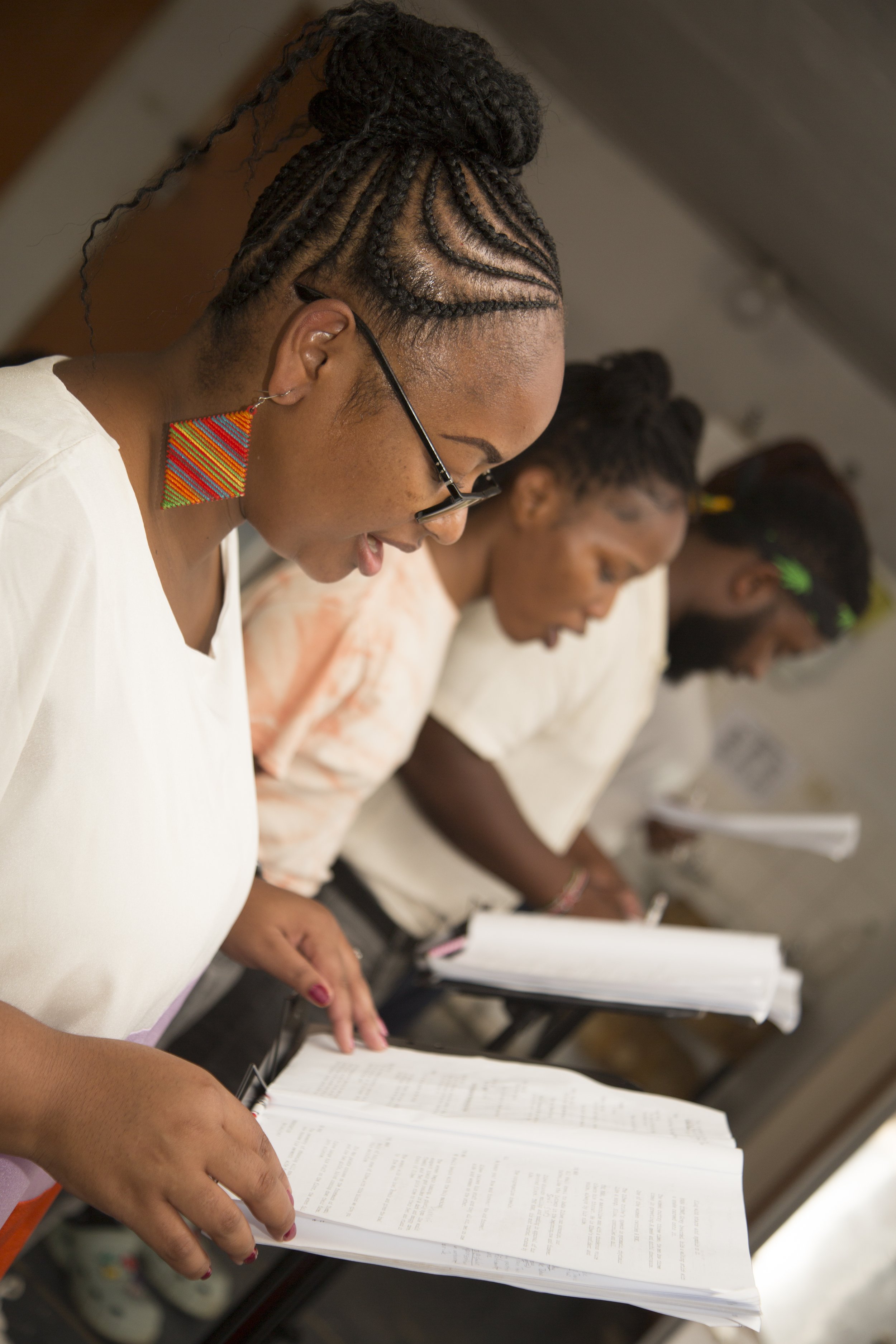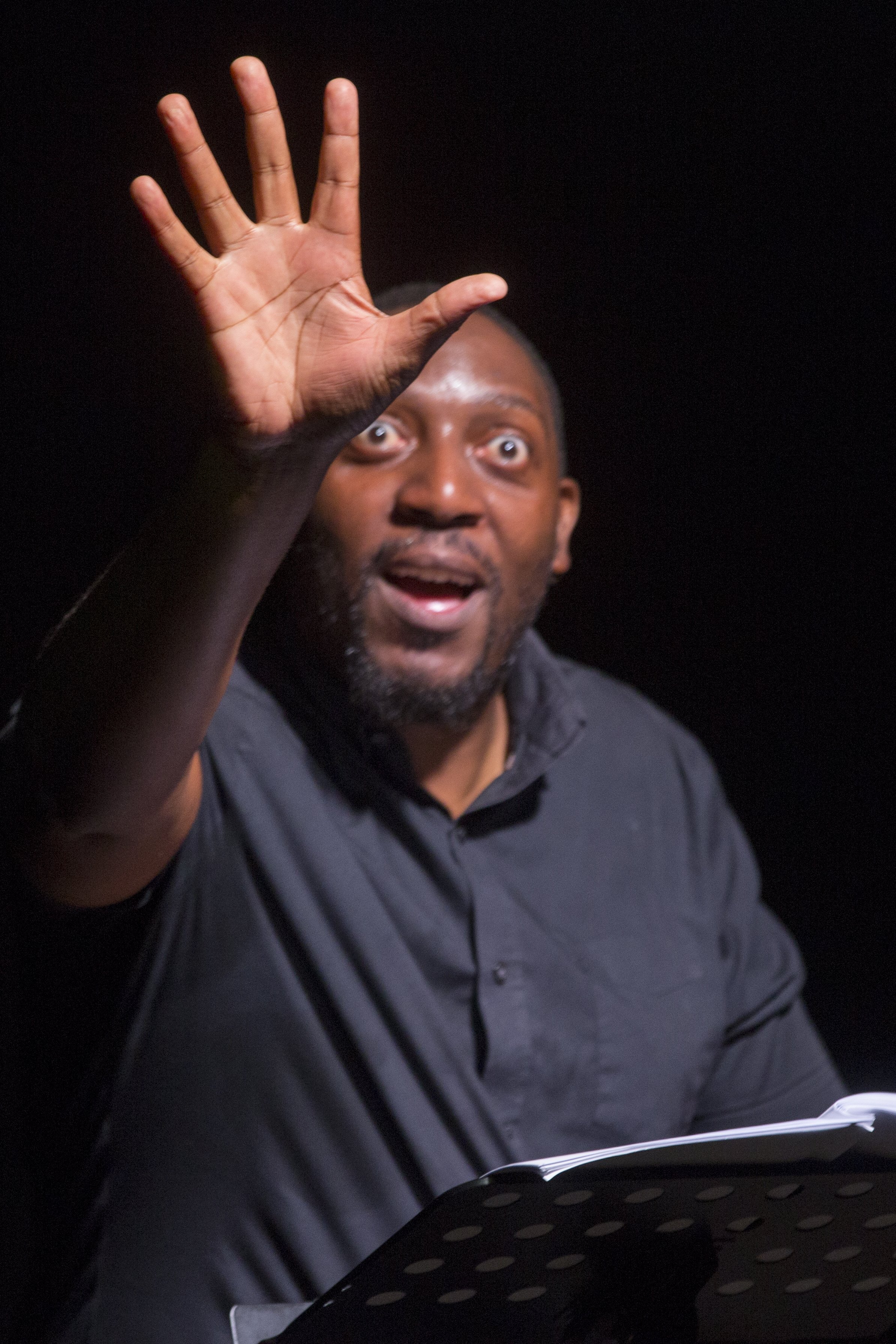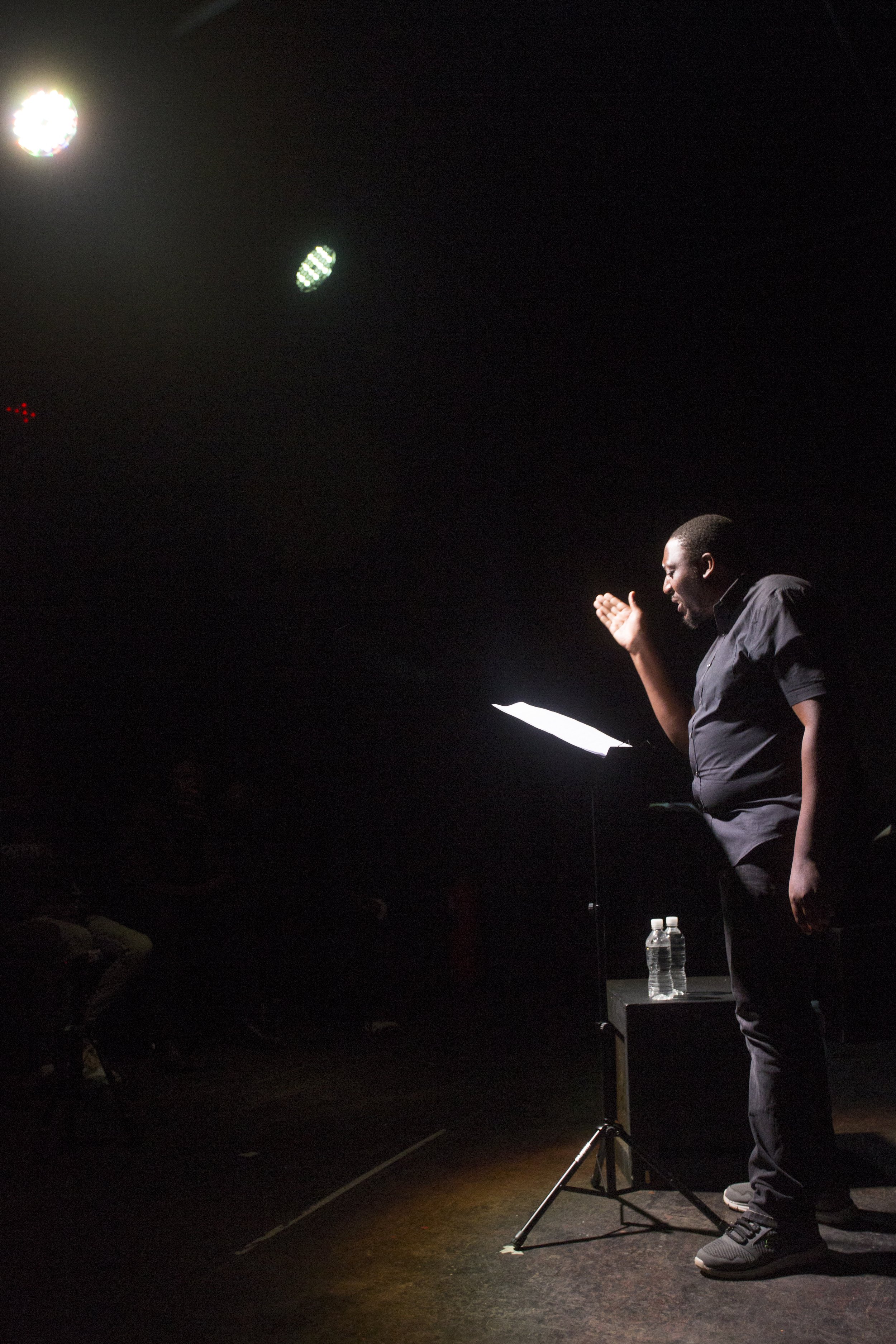Almasi African Playwrights Conference 2023
From 12 to 23 December 2023, Almasi held the Almasi African Playwrights Conference at Reps Theatre, Harare. Facilitated by Stephen Belber, Gideon Wabvuta and Sasha Emerson, the conference had the participation of 5 Zimbabwean playwrights Kingsley Chinhanu, Tinotenda Mangwendeza, Leonard Matsa, Tatenda Mutyambizi and Almasi Associate Artistic Director Zaza Muchemwa.
Over the course of two weeks the facilitators worked with the playwrights in further developing their plays. The process culminated in free public staged readings of new African Plays at Reps Theatre from 21 to 23 December.
On 21 December , 1:30pm Almasi presented a public staged reading of Four Women. Directed by Charmaine R. Mujeri the play is about four women running a men’s clothes shop as a cover for their sex work. The play looks at the women’s relationships with each other and their clients as they deal with the fallout that eventually comes when ambitions change. The staged reading performance featured Yeukai Mhandu , Cynthia Njagu, Dalma Chiwereva, Adler Mbofana, Cadrick Msongelwa and Minehle Mguni.
Audience Feedback:
‘The play was well balanced it was both humorous and educational.’
‘Well done Kingsley I could really tell that you appreciated the process.’
‘Thank you, Kingsley, for having the guts to write this play properly.’
The evening of 21 December saw Almasi at 6pm presenting a public staged reading of Viola by Tinotenda Mangwendeza. Directed by Sandra Chidawanyika-Goliath, the play, told in verse, explores the friendships, love affairs and betrayals amongst college students. The staged reading performance featured Tinevimbo David Chimbetete, Gabriella Pilch, Tadziyana David Bvumbe, Catherine Mutimusakwa, Clotilda Nyagowa and Francis Nyakuhwa.
Audience Feedback:
‘I love how your play is timeless.’
‘I enjoyed the verse that the writer used in writing his play. ‘
‘I enjoyed the characters in the play.’
Almasi the presented a public staged reading of A Westerly Wind by Zaza Muchemwa on 22 December, 1:30pm. Directed by Tafadzwa Bob, the play is about intergenerational trauma, unhealed land and the effects the living and dead have on fulfilling justice. It is centered on the relationship between two sisters navigating the grief of their father’s forced disappearance and the fracturing of the world around them. The staged reading performance featured Eyahra Mathazia, Maria Vera Chisvo, Clive Jonga, Thelma Mukonza and Simon deSwardt.
Audience Feedback:
‘I loved how personal the story was and its very similar to what is happening at my father’s farm where we might lose it to miners but that's where my father is buried. ‘
‘The language was amazing. There is something about each character's language and how it defined each character.’
‘I loved how totemism is always spoken in a bad manner but not in this play.’
‘I loved the fearlessness of writing about ATR.’ ‘The play was so alive, and it was brilliant how it evolved.’
On 22 December, 6pm Almasi presented a public staged reading of Tonde by Leonard Matsa. Directed by Makomborero Theresa Muchemwa the play, a solo piece, is a coming age story of a young man Tonde from a cotton farming village journeys from the unforgiving streets of Harare to the depths of Chiadzwa artisanal mining and back to his rural village as he tries to win his father’s respect. The staged reading performance featured the talents of the versatile and gifted Musa Saruro.
Audience feedback:
‘Actor did a great job. He delivered.’
‘Loved how characters had moments where they got what they wanted and other parts where they were disappointed, but it was arranged in a sequence where you couldn’t predict what's going to happen next.’
‘Loved Connie and Tonde’s horrible love story’
‘Loved that the characters’ jeopardy was very intense.’
The public staged readings ended on 23 December, 2:30pm with a presentation of Tides of Change by Tatenda Mutyambizi. Directed by Munashe Goromonzi, the play is about Tembi, a young girl growing up in a religious village, trying to get out of a forced marriage in the midst of the revelations which come from the collision between village life and the outside world. The staged reading featured Chido Joanne Tenga, Ngonidzashe Chikowore, Ronald Sigeca, Noziso M Gumede and Charlene Mangweni-Furusa.
Audience feedback:
‘Liked that it was a rollercoaster of emotions, the relationship between the characters was clear and amazing.’
‘I loved how crucial and relevant the story line is to pertinent issues of politics, deprivation and child marriage issues’
‘I loved the exploration of the collision of worlds and the power struggles.’
‘I loved Carol the old and how true Charlene played the character. I actually cried with her when she cried.’
‘I believe the future of theatre is in great hands because the new faces I saw on stage are young and energetic .
Almasi African Playwrights Conference 2023 was the sixth edition of the Almasi African Playwrights Conference.
The Almasi African Playwrights Conference is designed to identify new African dramatic writing talent and facilitate the further development of new African dramatic pieces.
A WORD FROM AAPC 2023 PLAYWRIGHTS
The power of sharing stories
By Tino Mangwendeza
Stories don’t really have any power unless they are shared. This is what I remember most from speaking with Patrick Miller about the conference. He challenged me and gave me the extra push I needed to even finish a play, which I had never done before. He showed faith in me even when I had none for myself. In honesty the exercise was complete, I had managed finish my play and submitted it, anything after that was a bonus, and what a bonus it was.
As a first-time playwright this conference was a monumental challenge that I thought I had prepared myself for but was met with a new revelation with each passing day. The mantra said every single day was that the conference was about the writers, a statement which didn’t fully sink in within the first days. There were a lot of firsts, first time hearing the play read aloud, first time meeting the characters within their element, first dread at the inadequacy of my material next to other, more seasoned writers.
But there is something truly liberating about being in a space and around people whose only goal is to improve what you did yesterday. It is exciting, thrilling even when the possibilities are never ending and the embers of creativity are fanned into an uncontrollable flame, with all the dangers that brings. The core of any story is its characters and the stakes at play. Every moment must be motivated, every action scrutinized, and every word must move the story forward. Easy enough to say but a grueling, emotionally satisfying process to go through.
Viola was originally conceived as a poem of love and loss but soon each line grew a personality and opinion. The iambic-ish nature of the dialogue was lots of fun to write and even more fun to see performed by the wonderful actors who joined us part way through. They brought life and soul to a story that had just been paper and ink before.
I would like to thank our director, Sandra Chidawanyika Goliath for seeing the vision within the words and being a beacon of wisdom throughout the process. No production would be possible without an excellent stage manager and Privey outdid herself in every department. I would have truly gone crazy without you. The excellent cast of actors who brought my dream to life; David, Chloe, Bella, Cathy, Francis I am eternally grateful to each and every one of you for lending me your talent and skill. Thank you to our facilitators Sasha Emerson & Stephen Belber whose invaluable experience will stay with me forever. To Gideon Wabvuta, thank you for the constant reminder that the process demands more than you will be willing to give, but give it your all and you will be rewarded. To my fellow writers, Zaza, Tatenda, Leonard and Kingsley; your creativity, imagination, honesty and determination were what kept me going when I had nothing left.
Stories have no power unless they are shared. I am happy and forever grateful that I was able to share my story with the Almasi African Playwrights Conference. Tinotenda.
My AAPC 2023 experience
By Kingsley Chinhanu
My experience at the Almasi Playwrights’ Conference was, without doubt, one of the most rewarding experiences of my professional life. I came in with my play, Four Women, and watched it turn into something more profound and meaningful than I could have imagined. The title itself actually changed to ‘Haberdashery,’ one which I found to be significantly better. I received excellent help from the three facilitators, Gideon Wabvuta, Sasha Emerson and Stephen Belber, and by the time the first week passed and the second week began, the play had taken a shape and form that embraced my original vision more than I myself had expected. Not only was the length significantly reduced, but a lot of the characters took on different shades that made them more well-rounded and unique. I also received valuable feedback from the other playwrights, the actors and my director, all of whom I worked with in such a positive and affirming environment, that the phrase, ‘it takes a village,’ took on a whole new meaning for me. I would like to thank Almasi for giving me this opportunity, one which I will forever cherish.
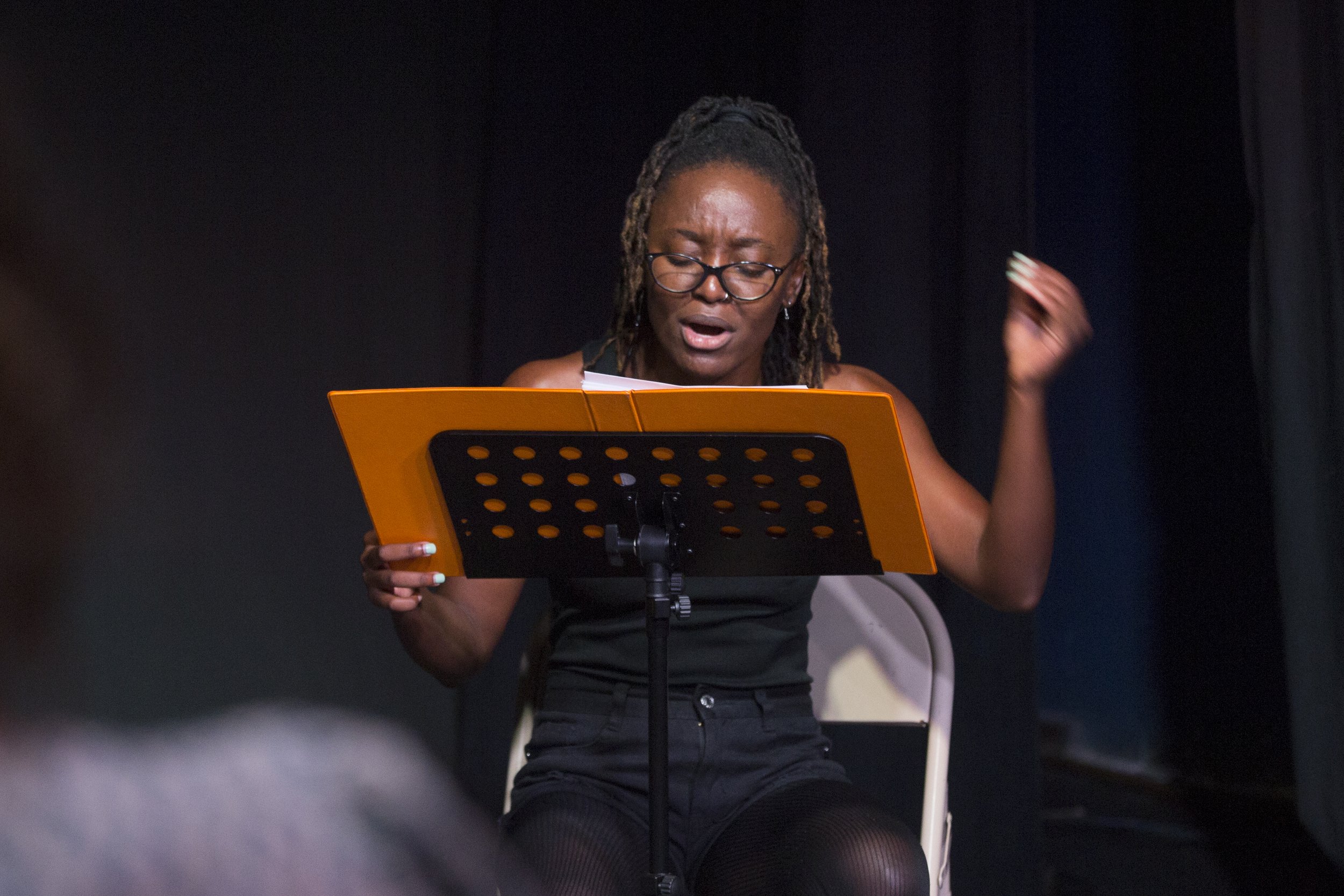
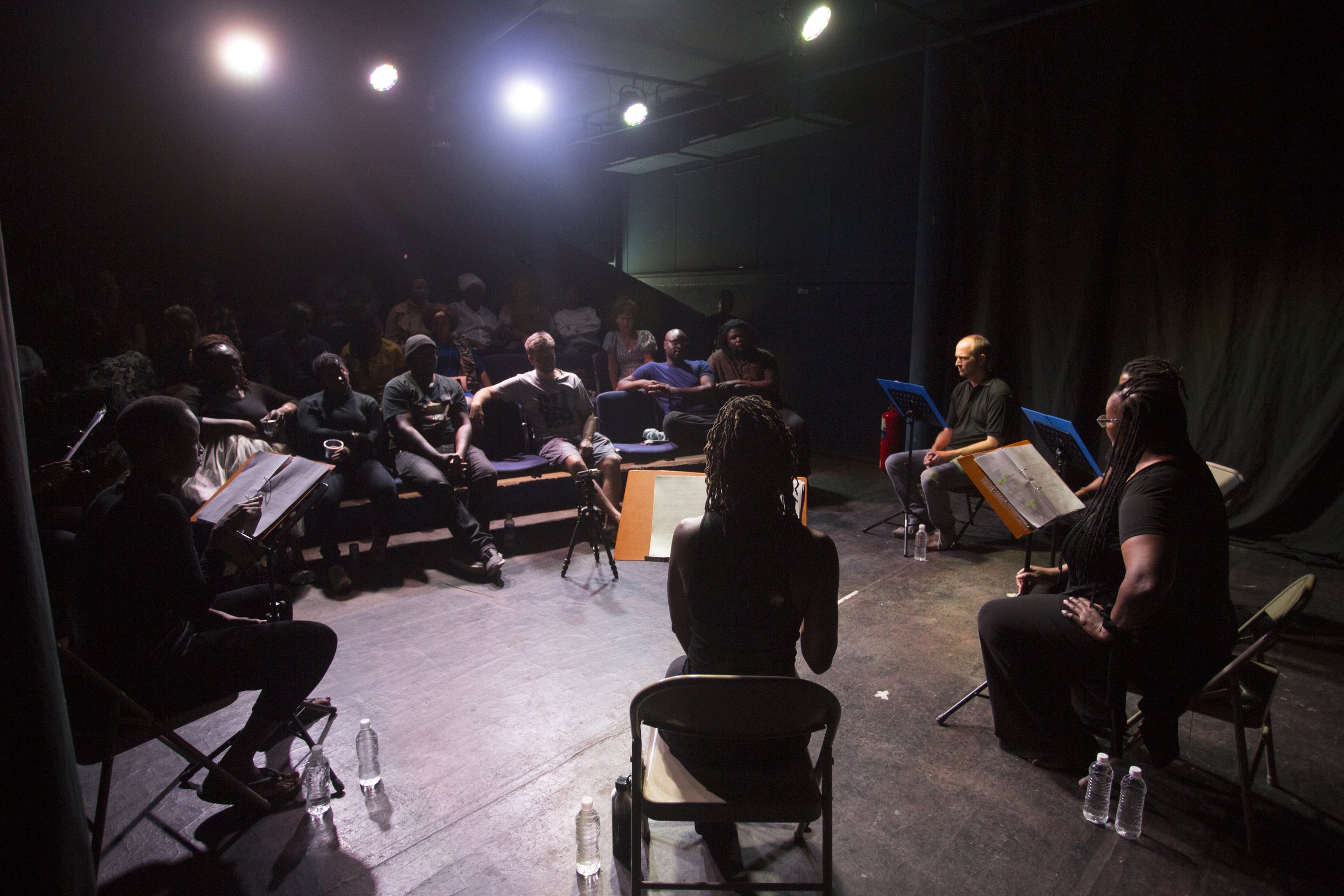
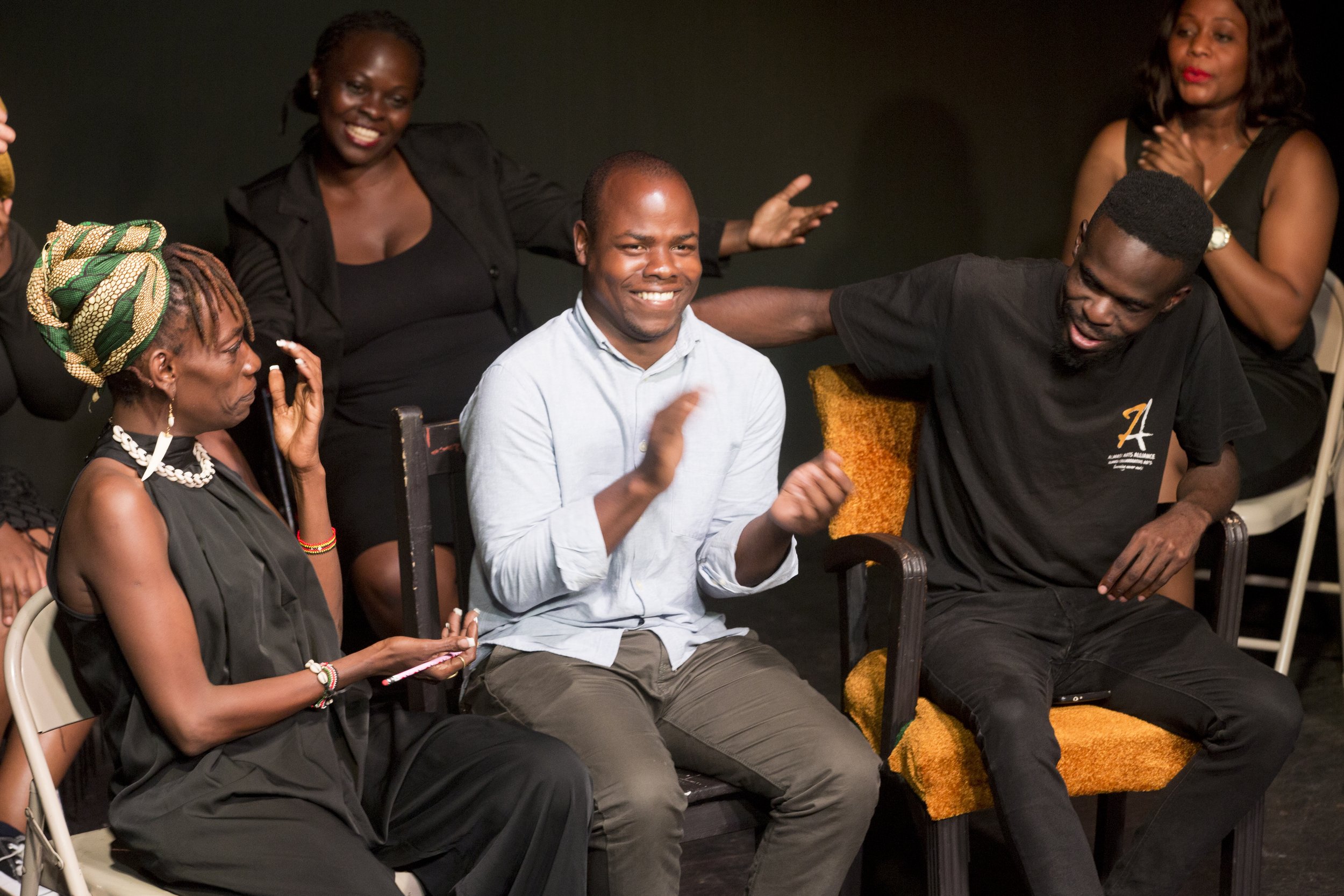
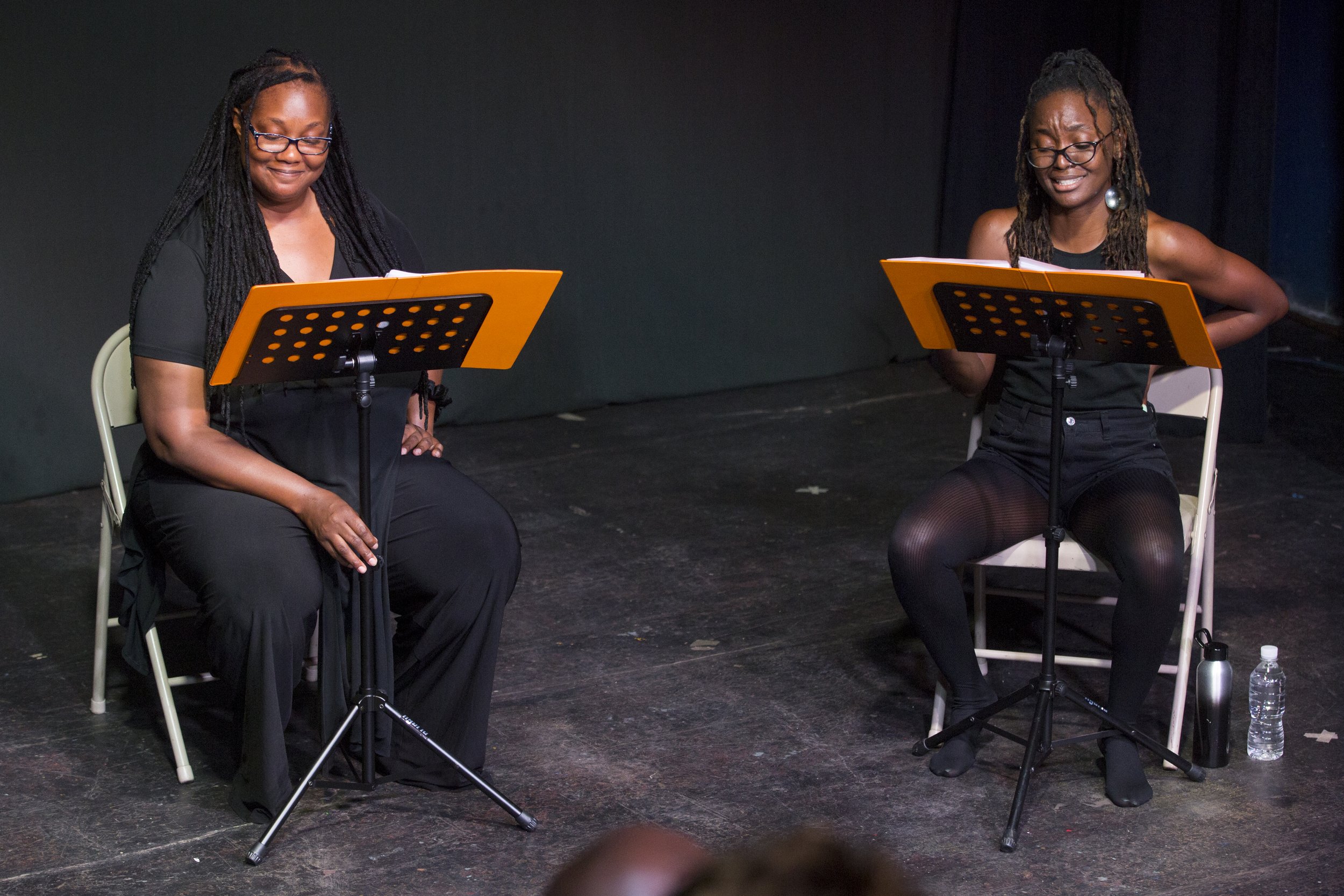
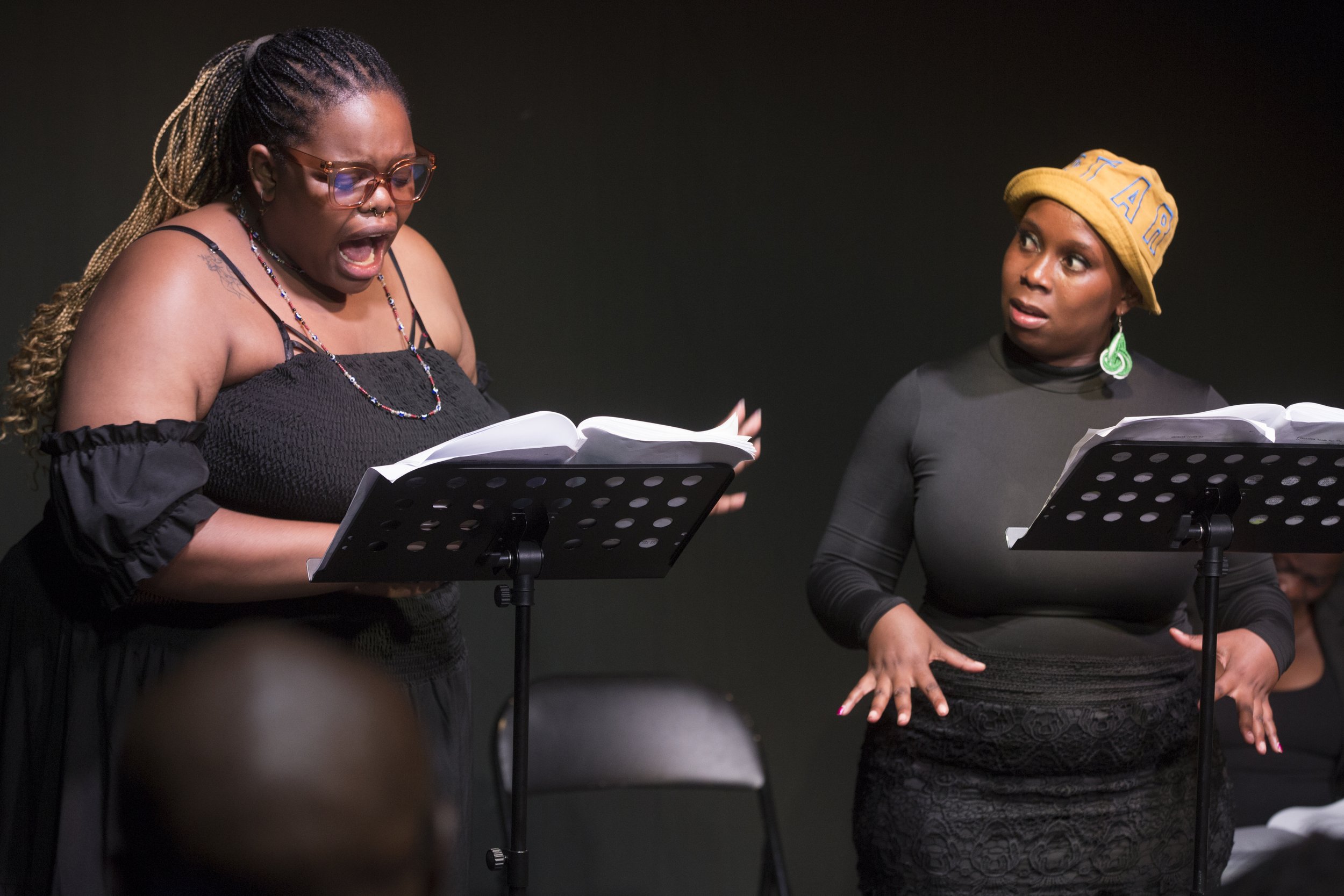
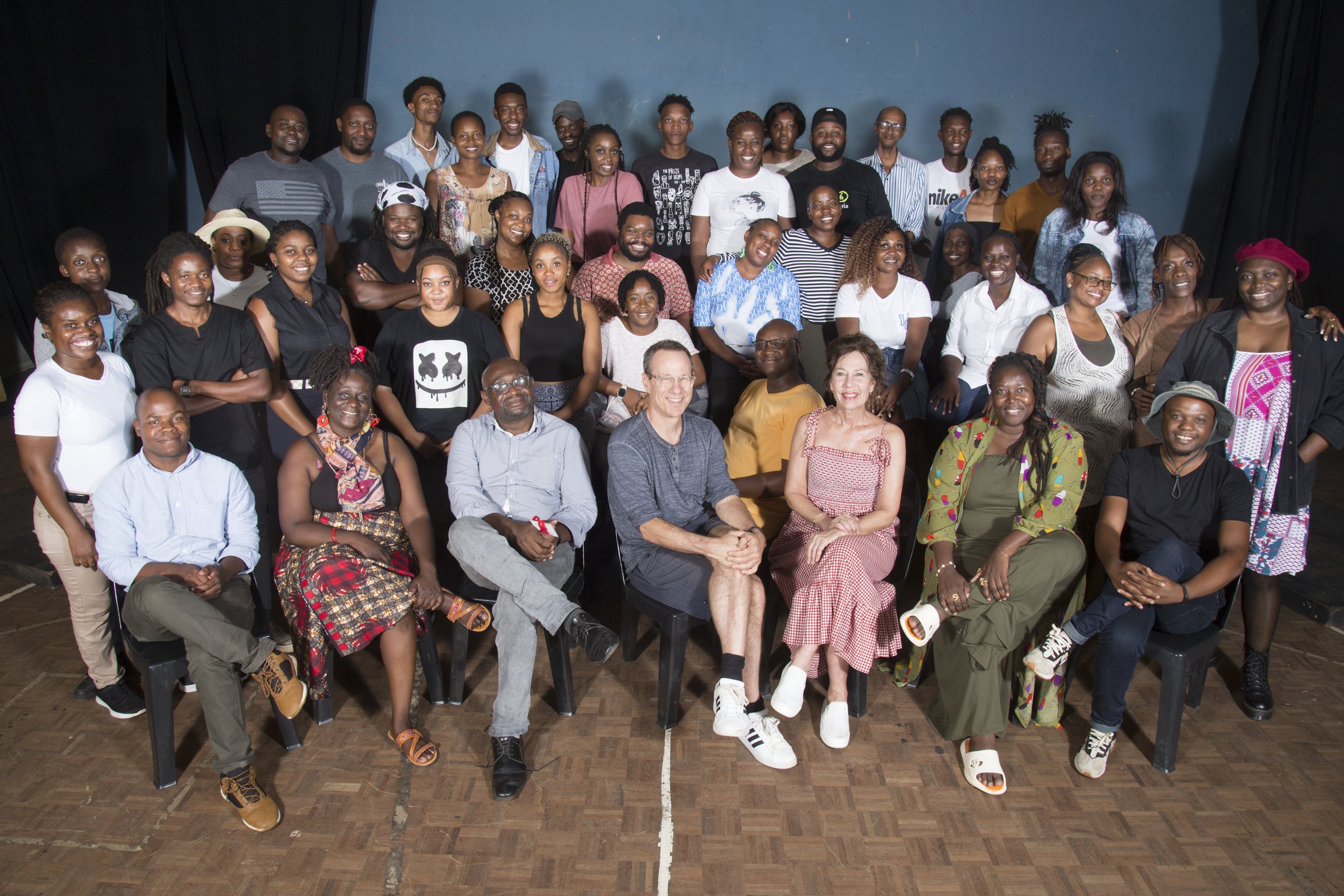
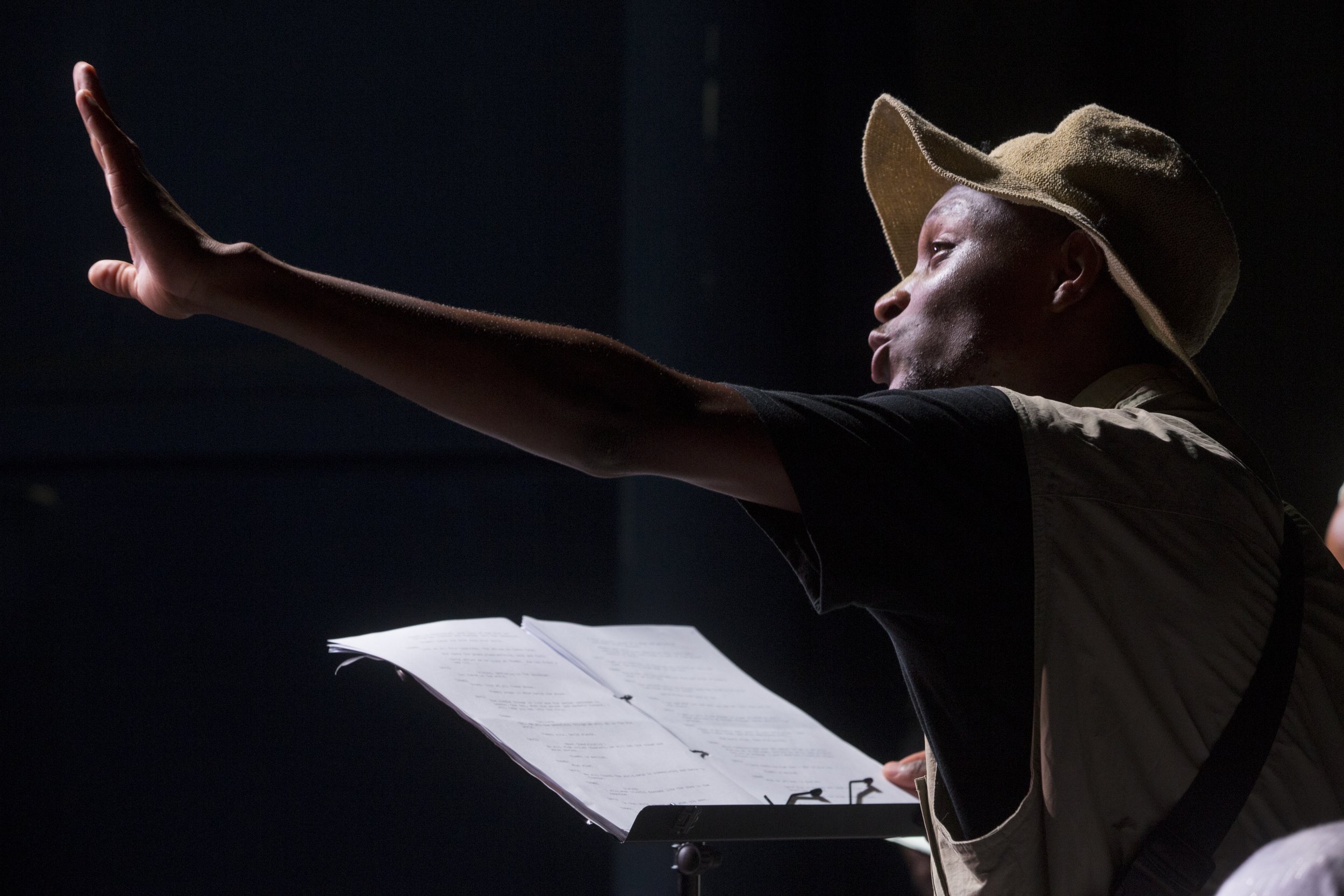
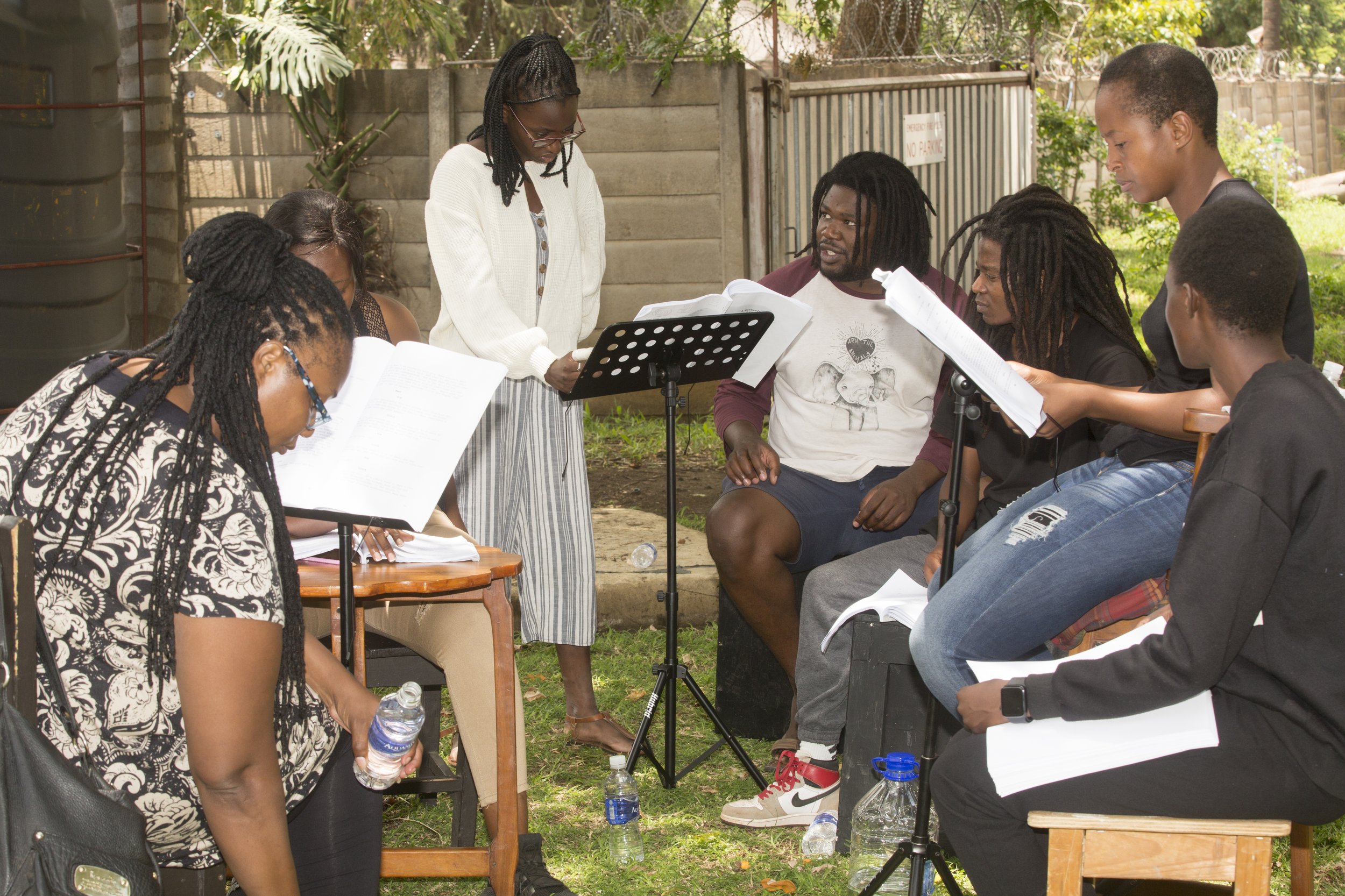
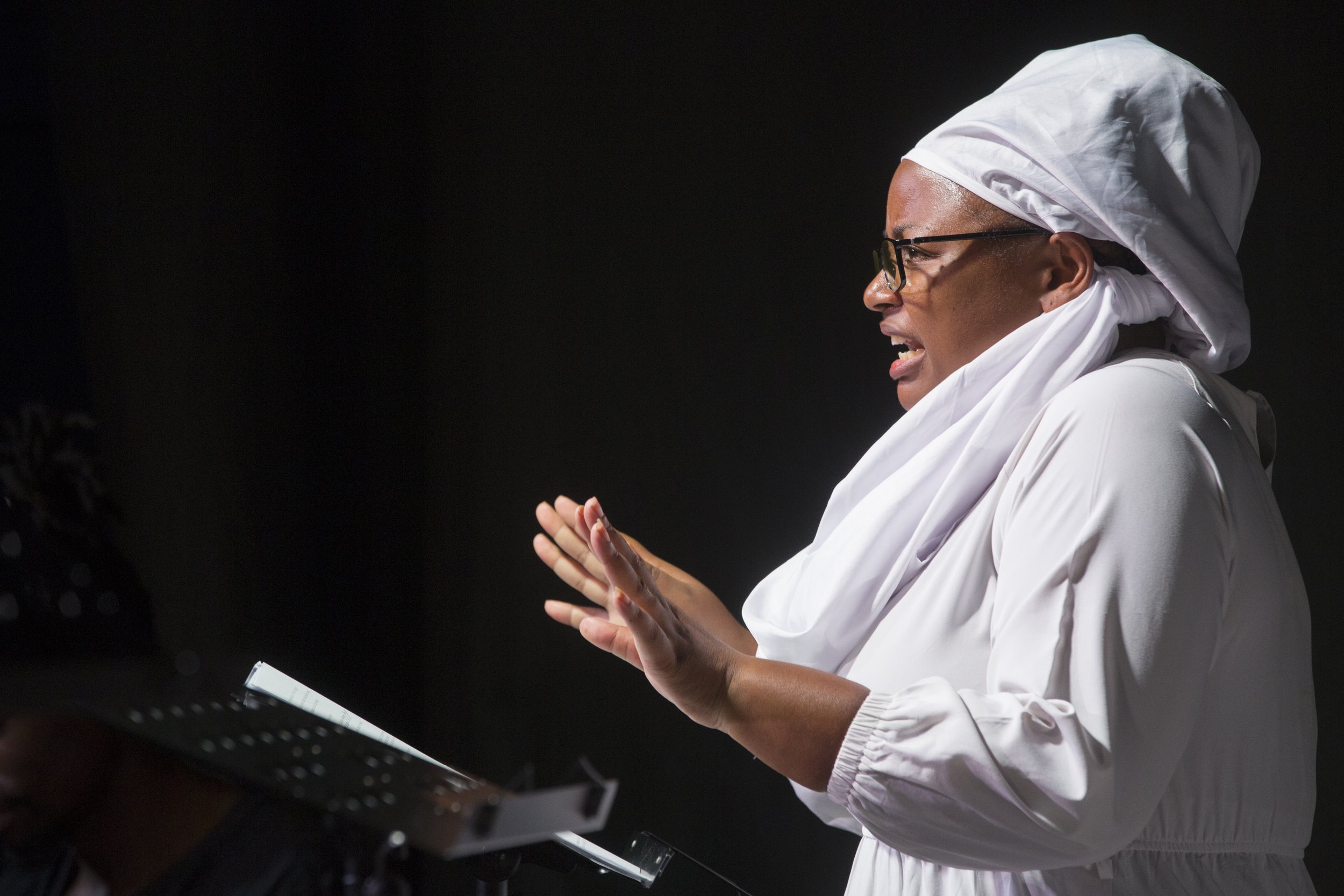
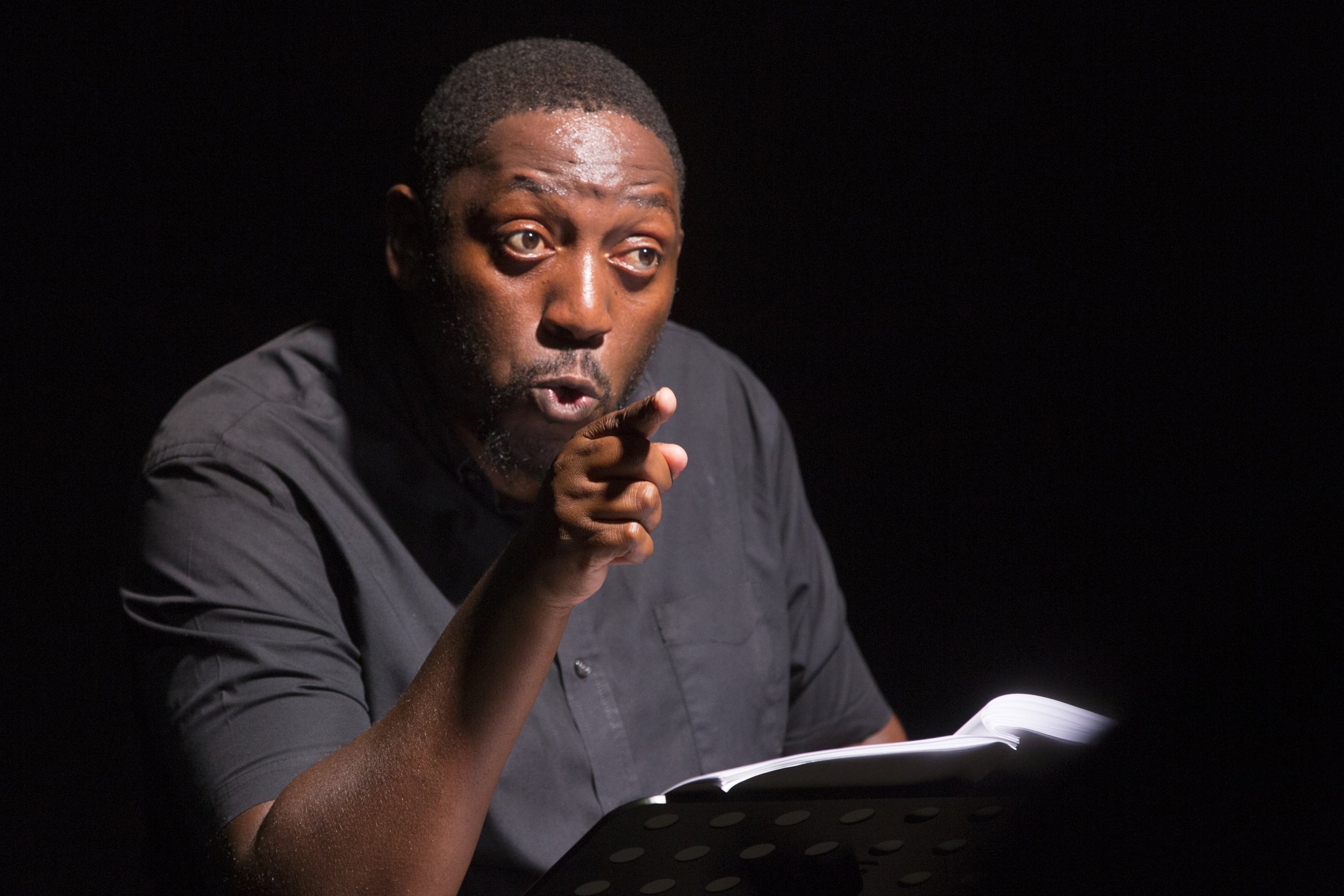
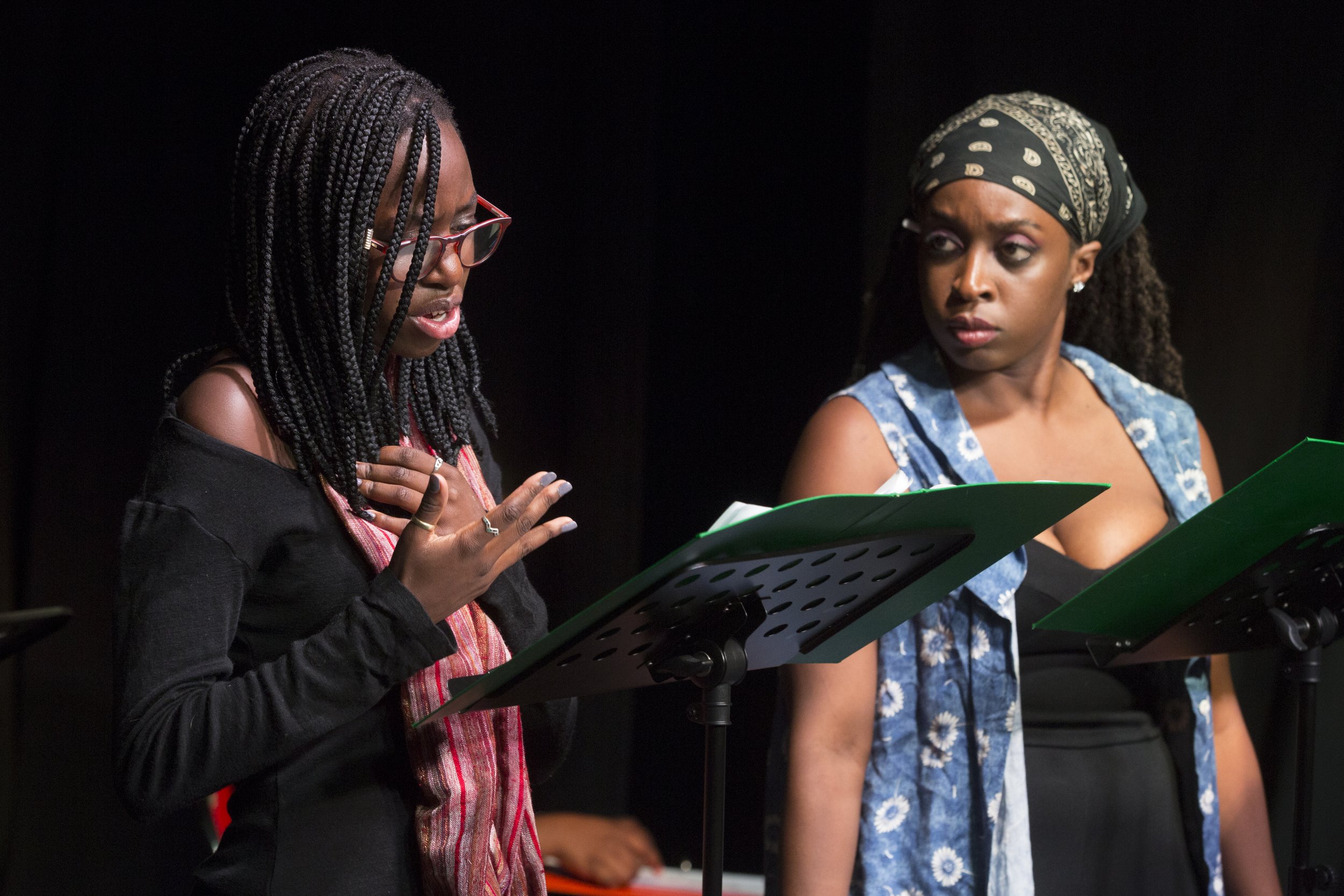
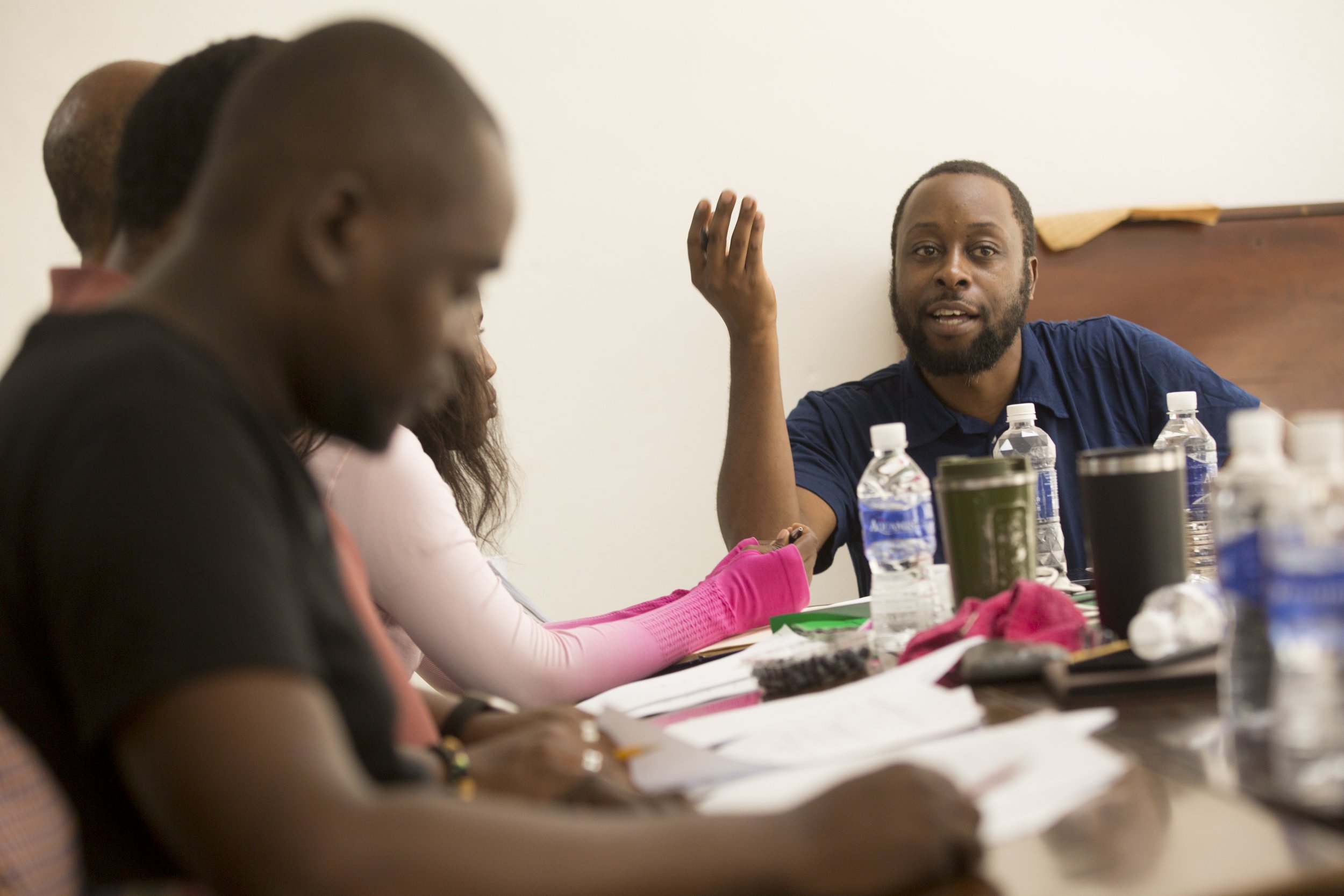
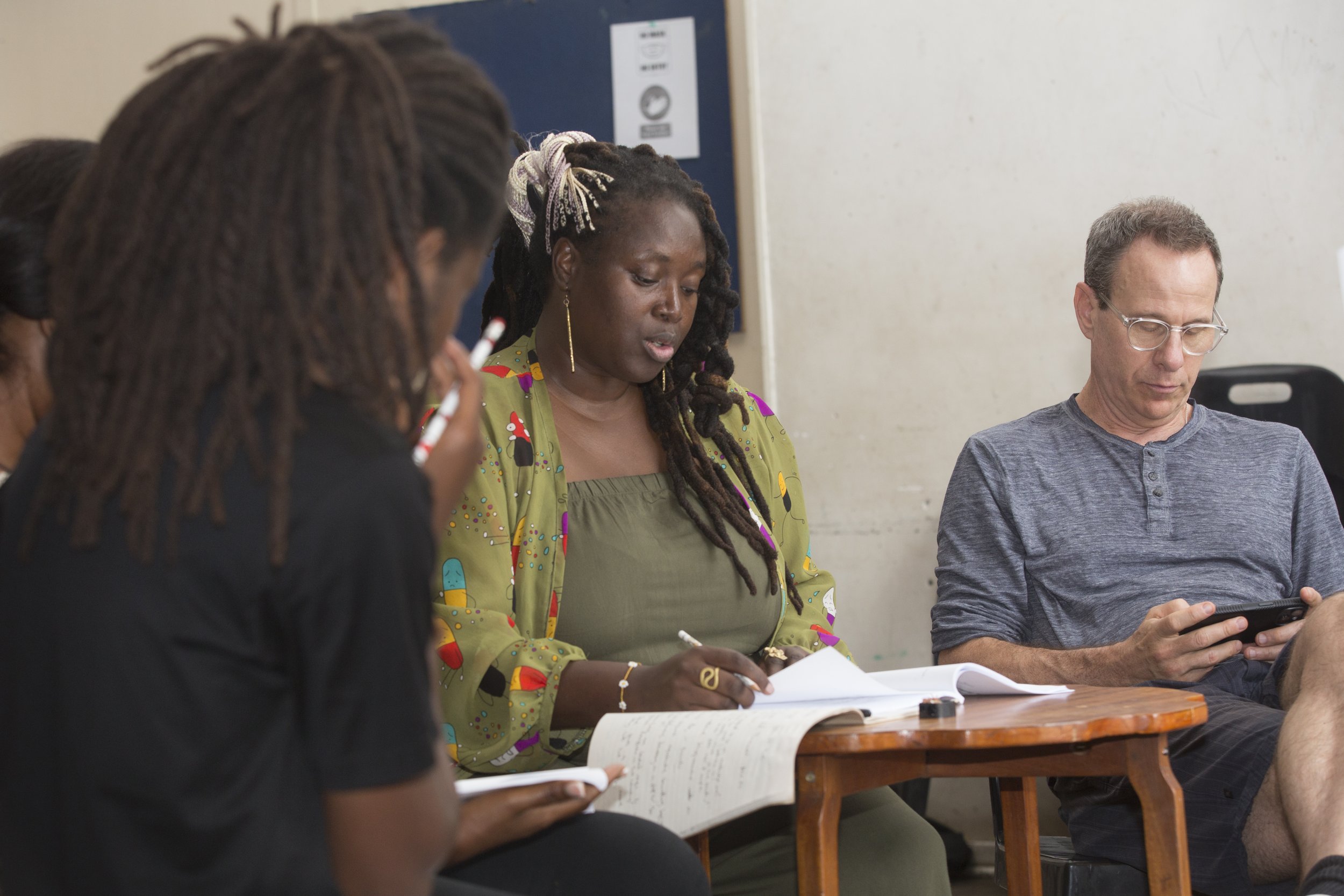
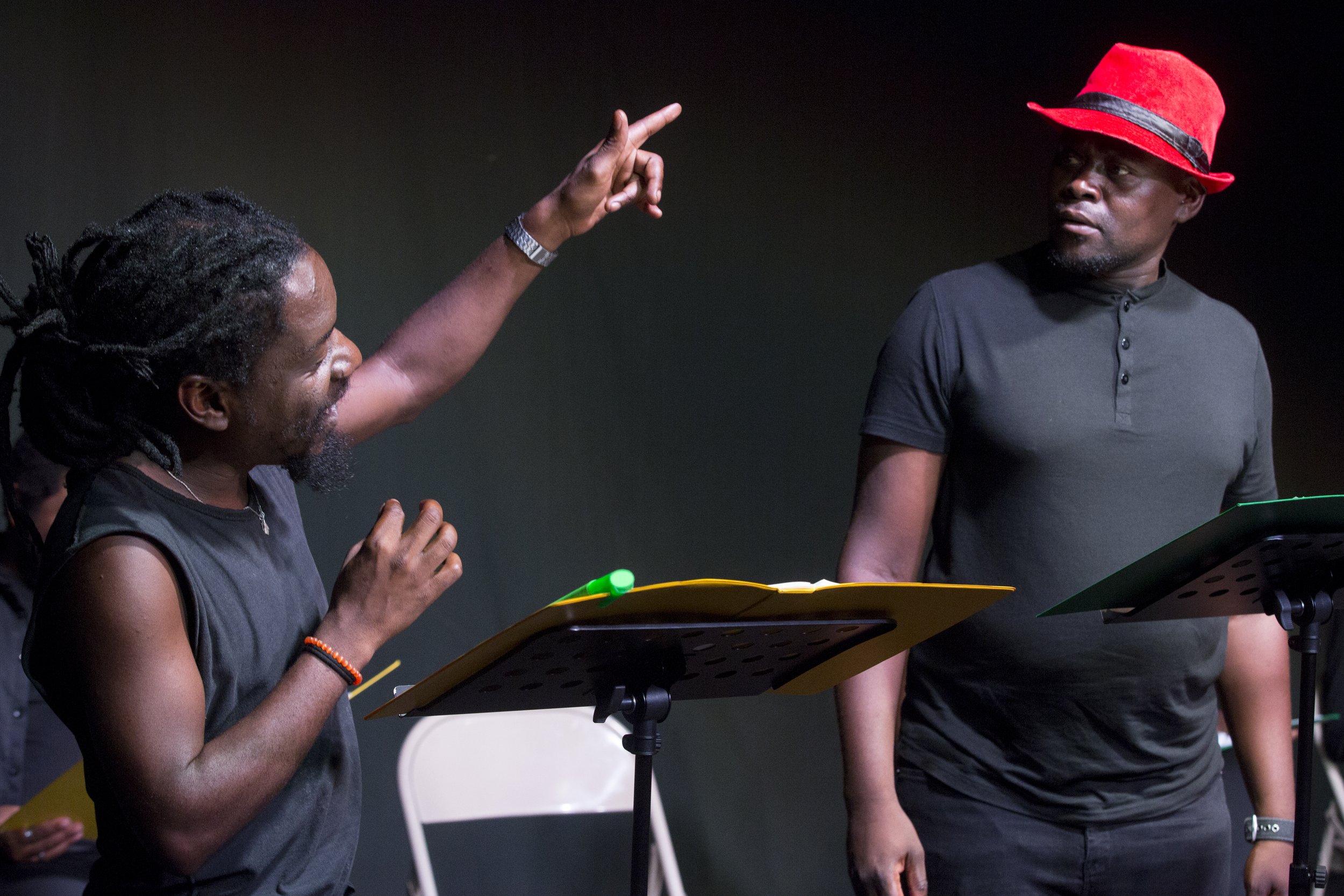
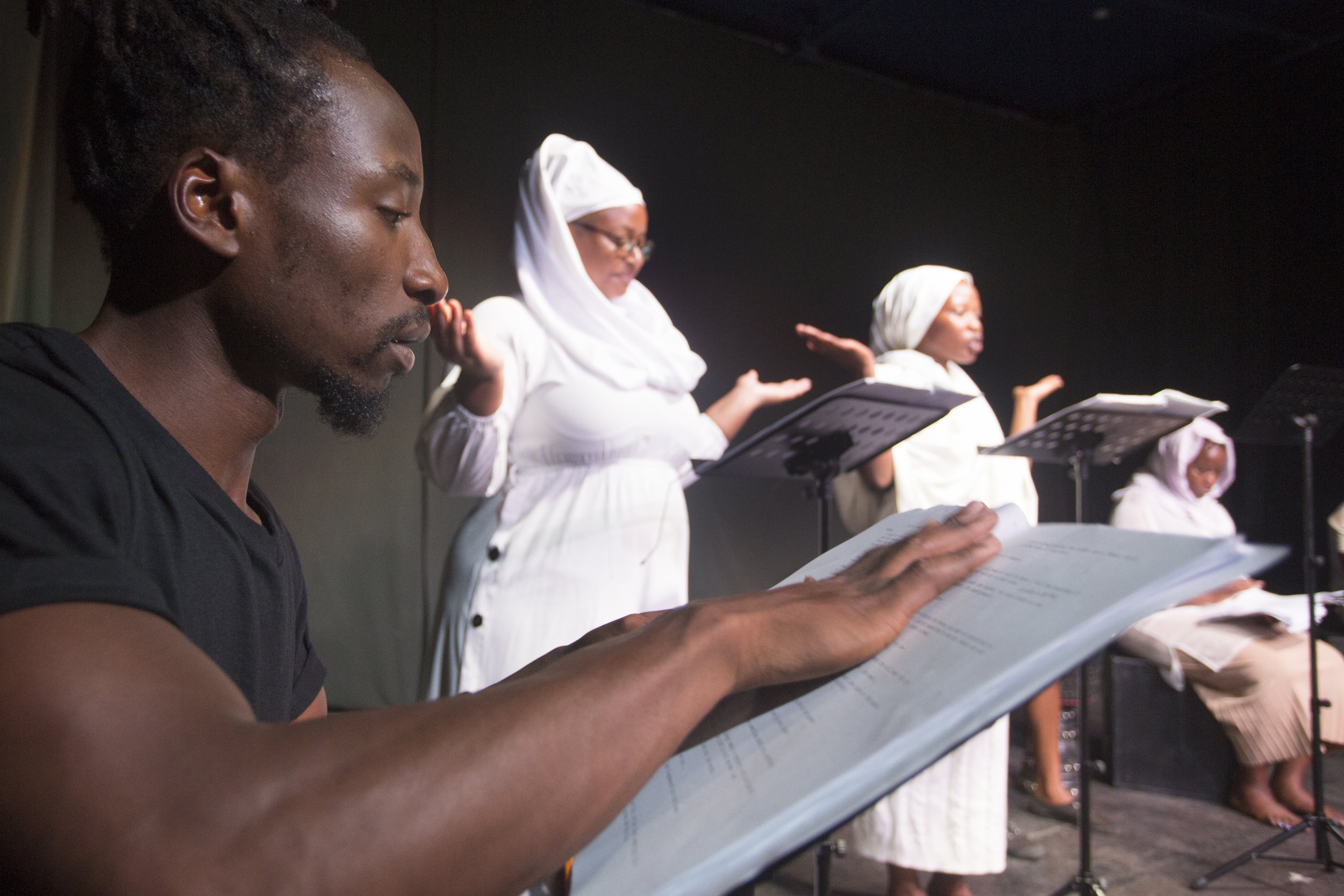
My experience at the conference
By Tatenda Mutyambizi
My second involvement in the Almasi African Playwrights conference was a completely different experience from my first. In 2021 in the midst of the pandemic and social distancing, the conference was forced to be a virtual one, whereas in this year's conference, we could meet in person and that proved a much valuable adventure.
The first week kicked off with a reading of our plays and feedback from theatre practitioners who were part of the conference. The questions and first impressions of the plays served as a stepping stone for us to think about our plays in-depth. Hearing other plays as well as my own helped me to understand the dynamics of the stories we were trying to tell. From the first read, the work began. I started to find the right brush with which to paint the world of the play with much clarity.
In the second week when the actors were introduced to the process, there was a certain shift from the focus of story to a focus on the inherent needs and motives behind the characters of the play, at least in my accounting. The actors brought forward the inspiration and the questions necessary to help me dive into each and every character, as each actor found.
As I learnt from the first Playwrights Conference, collaboration is a major instrument into the creation of a good and credible play. The knowledge and support I received from everyone who was part of the process was a catalyst in me finding my strongest voice, within the play, and indeed in life. I learnt to be humble and to use other people's objectives and questions to strengthen my own. Though my play (Tides of change) is not entirely a finished product, it has become a much better piece than when it was first read. I am grateful to Almasi, and everyone who was involved in the process, for surely I have made notable strides in my writing process and in advancing my skills.
Unburdening oneself at a writing mecca
By Leonard Matsa
I participated at the Almasi African Playwright Conference of 2023 with my one hander play, Tonde. Before this, I had attended the other AAPC editions as an ordinary member of the audience enjoying the many beautiful stories by other playwrights. AAPC 2023 was therefore my first time to be one of the conference playwrights. And what an experience it was!
When I applied to be part of the conference as a playwright, I had no clue on what it would involve, but from the testimonies of previous edition writer-participants, it was clear the process make stage plays better! And I wanted Tonde to be better. But even more important, the conference improves your writing skills beyond the script that one will be developing during the conference. Additionally, the process helped us writers to link up with other industry creatives for future collaborations. By its design, the conference inherently provided us writers with an immediate and assorted mixture of international and local audiences making it easier to test the universal appeal-ness of our narratives throughout the process.
The various readings of the stage plays throughout the conference process benefitted writers to gauge audience emotional, and other, reactions to the narrative, thus providing crucial insights on what to keep, magnify, tighten or even lose to make the narrative more dramatic and universal.
My participation at the AAPC was an interesting graph of feelings though. See, I was the oldest playwright, amongst very young and talented writers. And one of the young writers was on their first play. This situation somehow created personal pressure on me. That I had to be seen and act the oldest. Even and especially on meeting task deadlines. Yet for the process to work I had to allow myself to be as vulnerable as possible. At the end I chose to unburden myself from the yoke of age and became vulnerable much to the benefit of the play.
The other thing that stands out and most memorable about the conference is the support we writers received. By its mere design and premise, the conference is a mecca for playwrights. The support at the conference is stuff you only read of in writers’ chat rooms online. One gets to get a director, an assistant director, production manager and professional actors to help read and semi-stage the play. For me it was very helpful because Tonde was my first attempt at a one-hander. So, reading it in play-form assisted me to identify areas where the play was slipping into novella domain. It even made me start to question if the play was indeed a one hander or I should bring in more actors. At the end I resolved to resolve the cast issue, as opposed to the easy way of changing the play’s form.
I was very fortunate that my director (Theresa Muchemwa), assistant director (Chelsy Maumbe) Actor (Musa Sauro) and Chantelle Gore (Production Manager) are writers in their own write. They were patient but demanding when need be. Which was every time! As fellow writer however, we spoke the same language and I benefited greatly from them.
AAPC was just a gathering of generous souls I found out. For example, I had done research for the play. But during the conference almost everyone would approach me with more research information (some of it first hand) about the play’s subject. And every day it became clearer and clearer that people really wanted the plays to succeed.
The process ripped open the play on all levels i.e., story, character and emotional arc, relationships, structure, meaning and even medium (stageability) of the play. Making the play clearer and giving it more depth.
I am currently doing another draft of the play based on the feedback and notes from the conference. I am super proud of how it is shaping up and can’t wait to share this beautiful and well told story with the world. See you at my play’s show, see you at AAPC 2024!
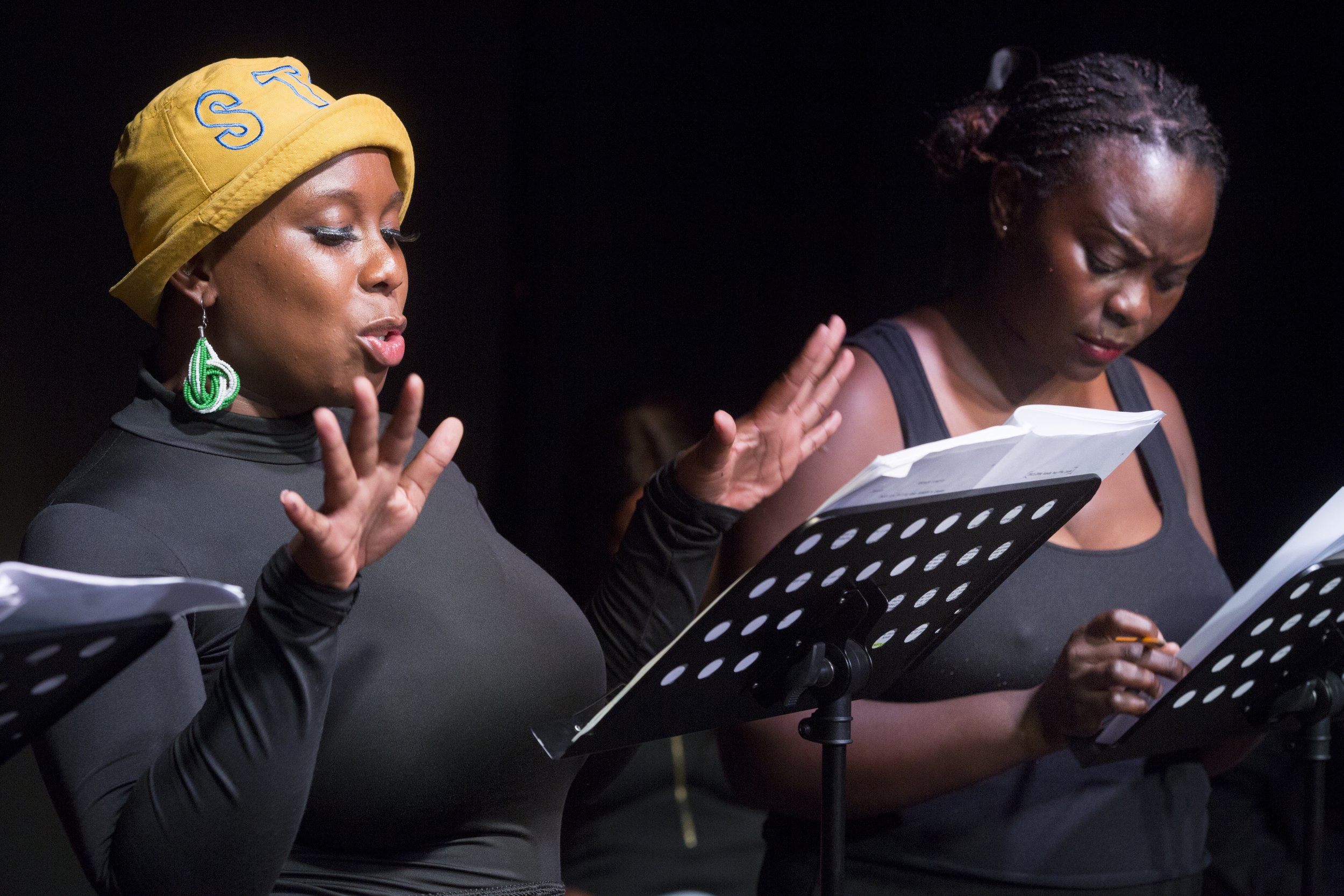
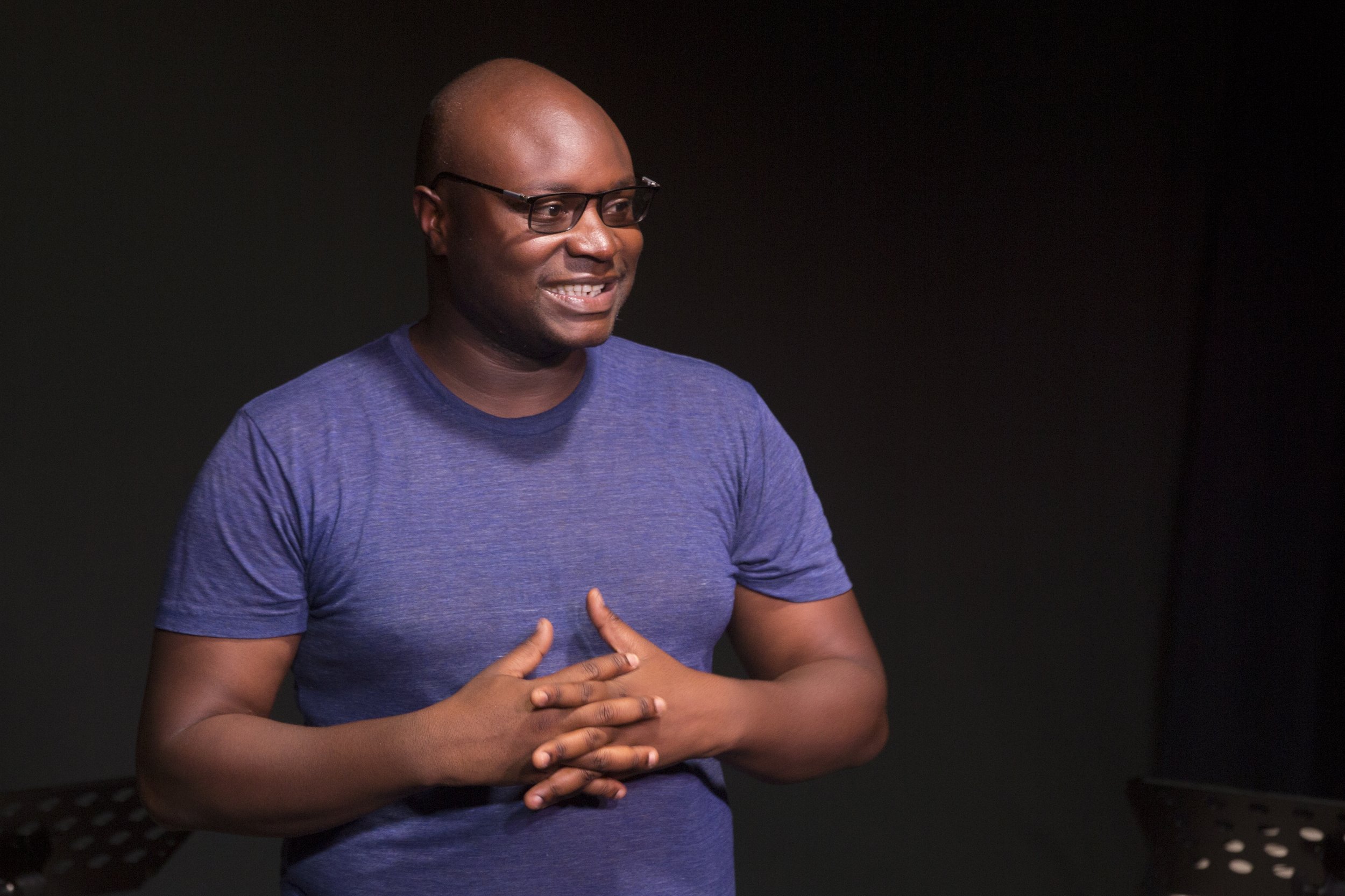
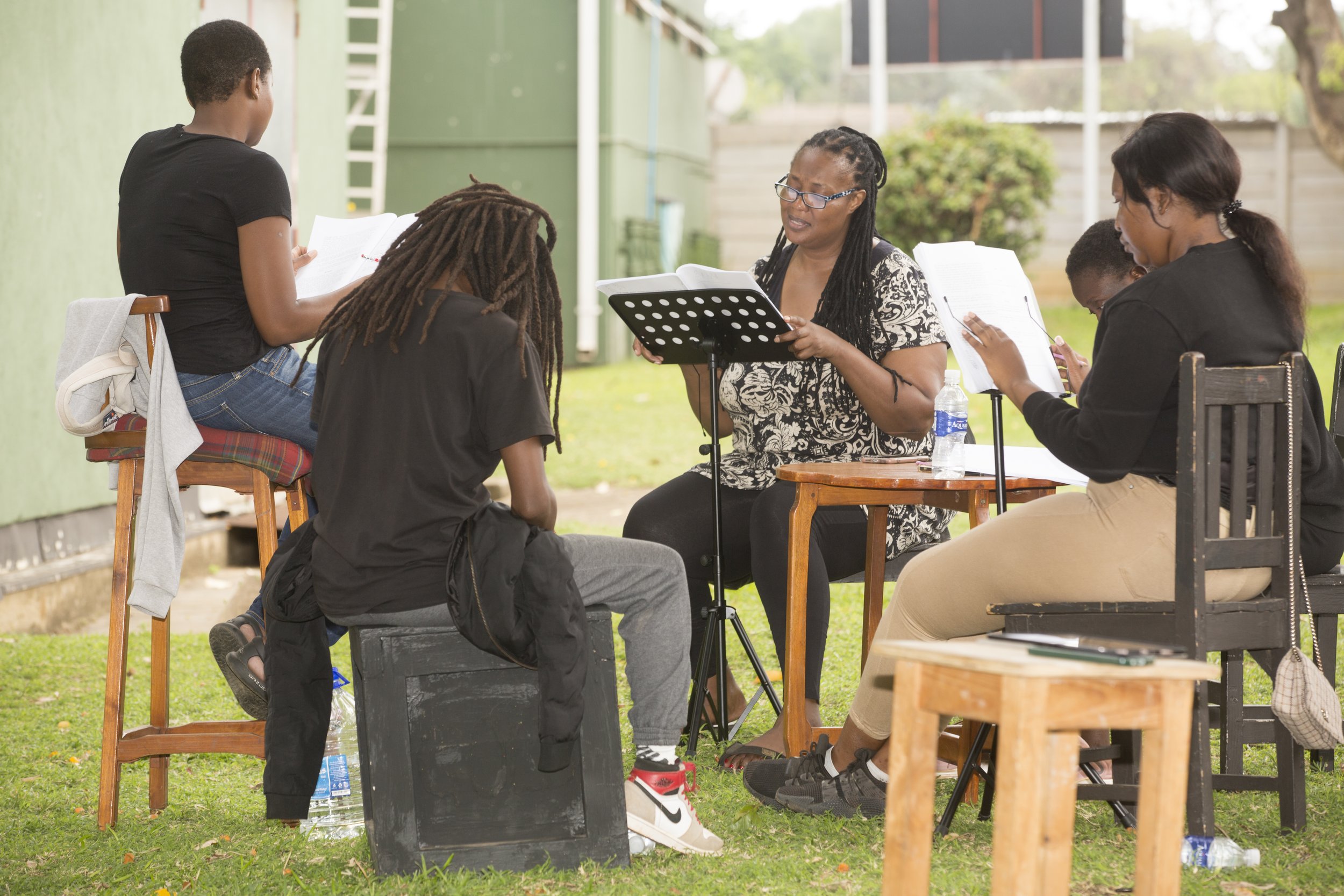
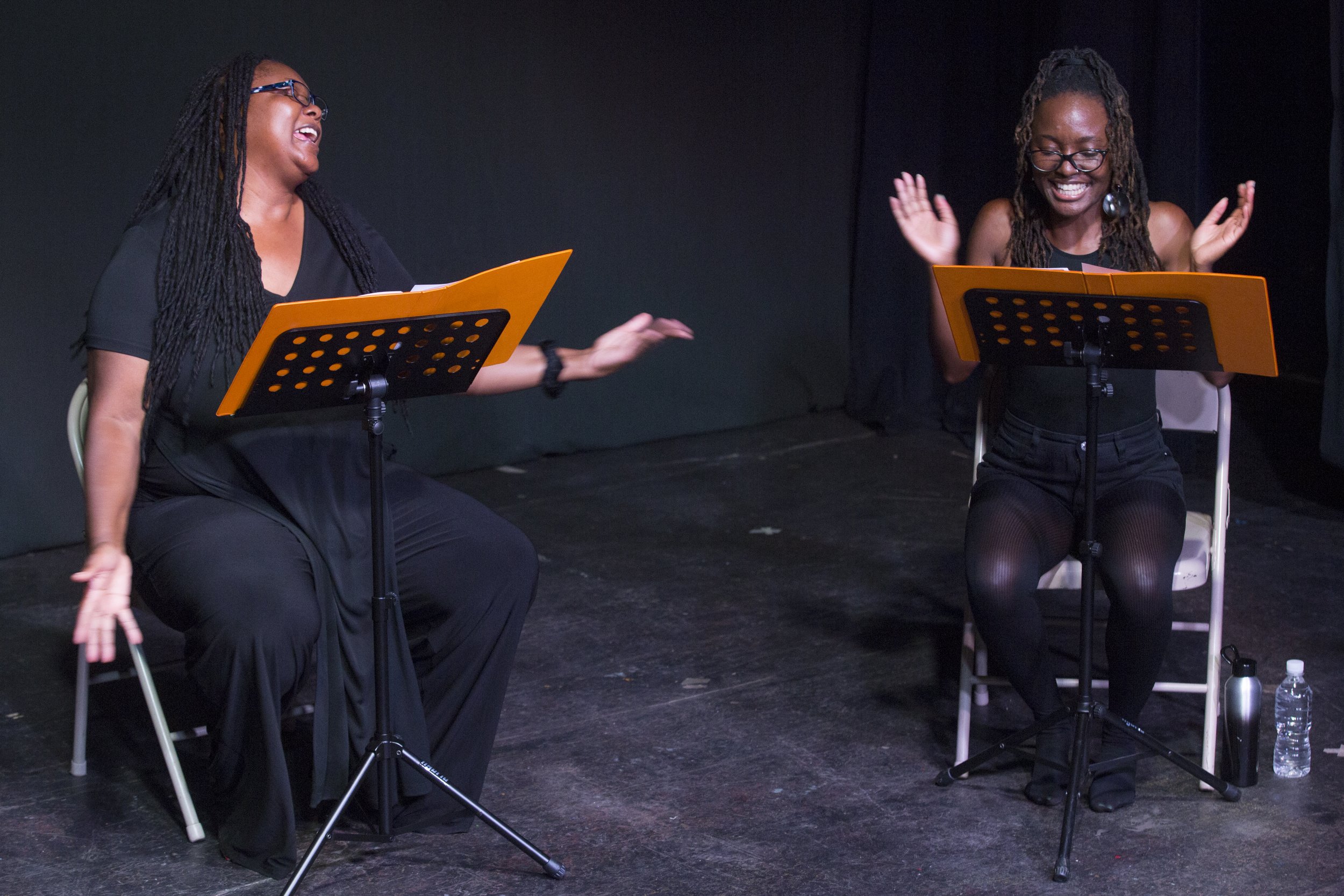
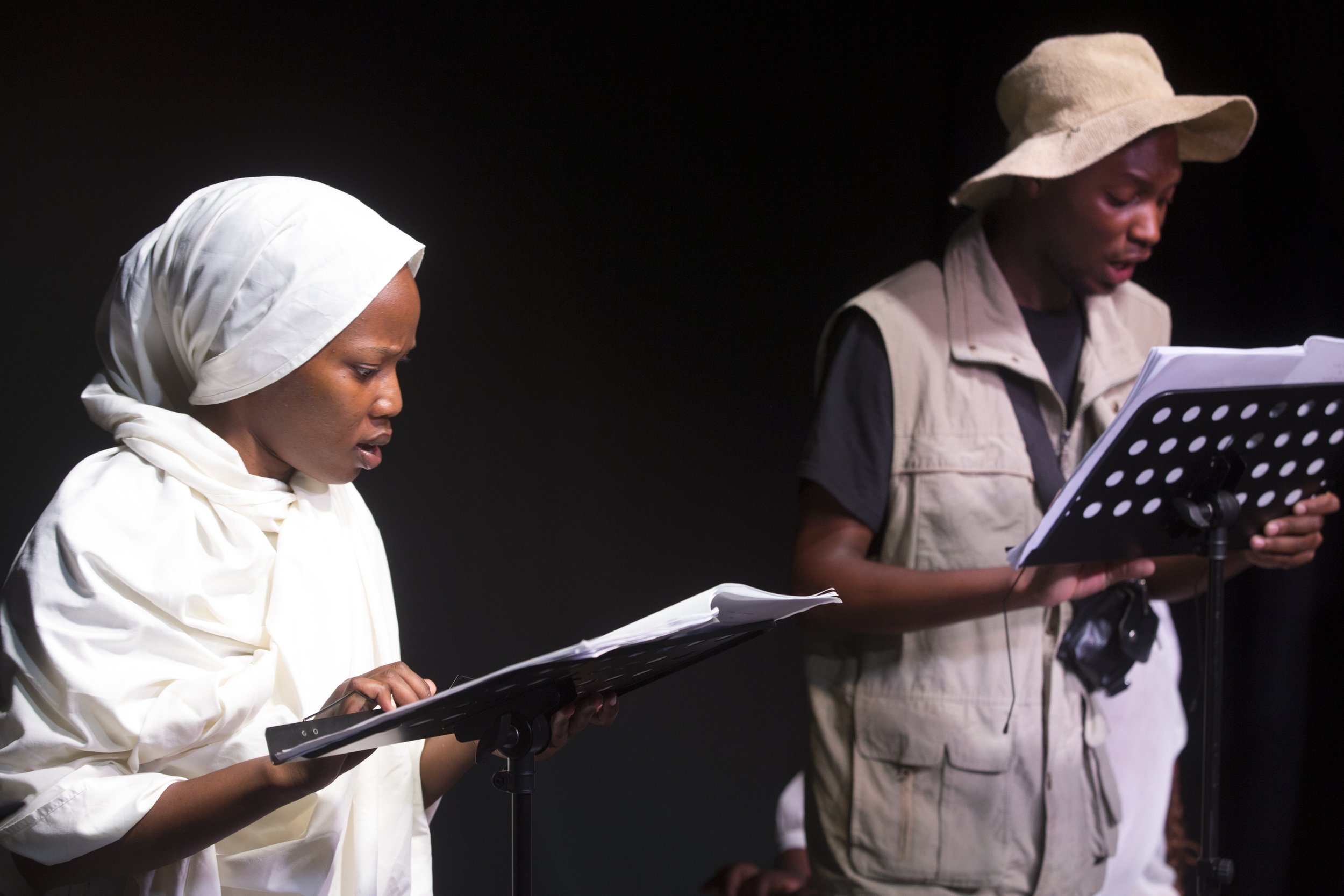
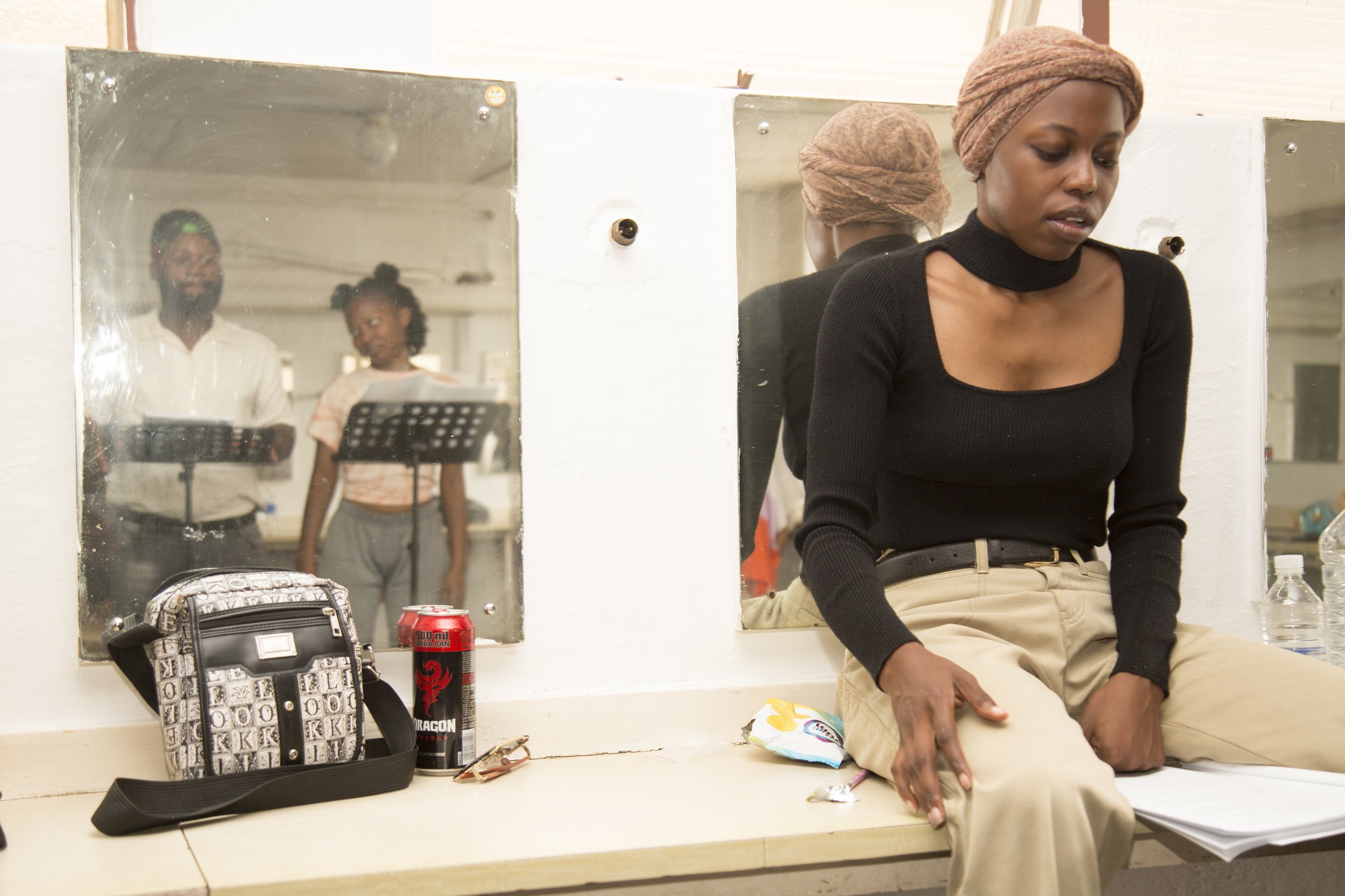
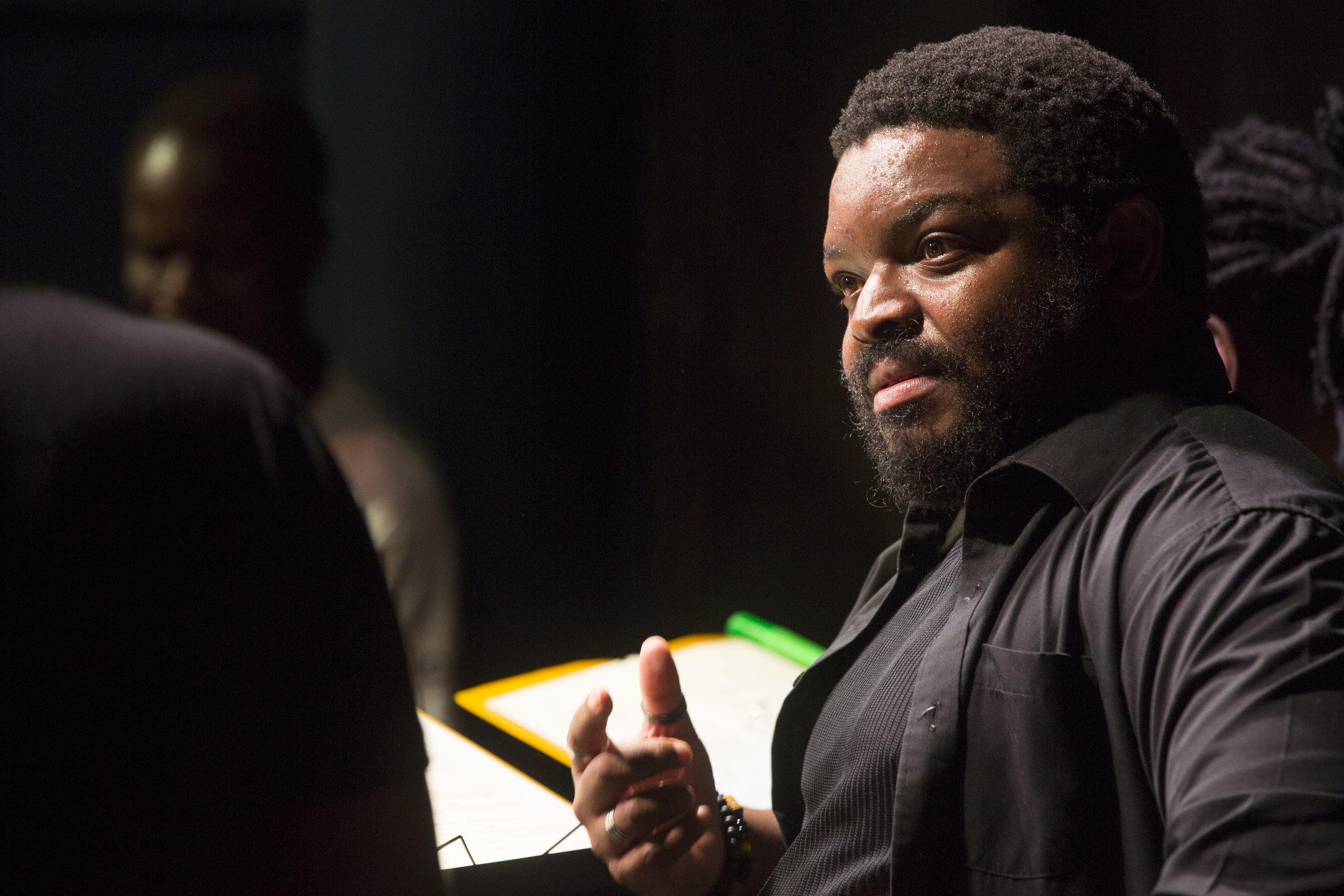
Of change, personal growth and writing courage
By Zaza Muchemwa
Change is a thing fluttering in your hands, refusing to be held down. Yet it is the only marker we know of growth. And growth is what we seek in ourselves as artists and in the work we do. After having spent a couple of years towards a complete draft of my play, I didn’t think I was up for the rigor of the Almasi African Playwrights Conference. A rigor I learnt of as a playwright in the 2015 edition. I didn’t think I would have the strength to bring about any significant change for my play during the 2023 edition.
After all I had been working on my play, A Westerly Wind, for a year and a half as part of the East West Players Playwrights Group 3 fellowship. The process culminated in online Raw Readings in October 2023. In the weeks leading up to the event, I had spent sleepless nights writing to fulfill the first draft. I thought to myself, ‘It’s time for a break from the characters, from the world of the play, this play has taken a lot from me. And for now, I have given it enough.’
Sometimes there are stories, floating in the ether and swirling around you, that will mark you. They will take up space in your heart and refuse to leave until you tell them. The story of two sisters dealing with the disappearance of their father as they navigate change coming to their home and the changes in their relationship, came out of a writing class. I met these two and decided to probe a bit more. I explored their needs, their wants and, what happens to them as they grow up in world becoming fractured. And once I was done with the first draft, I was certain I would not look at the play again for a few months. As I felt that at that moment, I didn’t have anything else to give. Boy was I wrong.
The Almasi African Playwrights Conference came up. In November 2023, the plans for the 6th edition were finalized. The conference was set for December 2023. But because of the timing of the conference, we were short of a 5th playwright. And I remember saying to Gideon, our programs coordinator, that if we get really desperate, I have a play that needs further development. Even though I wasn’t keen working on it anytime soon, since I had just completed the draft in October. I thought December was too soon. But if we were to get desperate, I would step in. Trying to be a good team player and all. I sent Gideon draft one of the play. He started reading it. While he was still reading it, he told me that we would not need to look for a 5th play. He had found one in my play. Our dates were getting closer. And there was no way to it. ‘It’s no biggy, right? I would just have to find that writing switch again, right?’ I told myself. But the Almasi African Playwrights Conference is no child’s play. You cannot half ass it. If you are any self-respecting professional, you find it in yourself to be fully present. And you do work which honors the gifts of the generous 40 plus dramatic arts professionals showing up for your play. So, I was in this. Or was I?
The conference begins. It’s the first day. We are meeting with the facilitators Stephen Belber, Gideon Wabvuta and Sasha Emerson. They ask us to introduce ourselves, share a short synopsis of one’s play and what one hopes to achieve with it during the conference. I am sitting there in the circle readying myself to talk about my play. In my head thoughts are swirling; what the hell am I thinking? I am not ready for this. I wrote this play from a visceral, subconscious and spiritual point of view. The kind of work that would be needed to bring about meaningful change to the play, would involve hunkering down to the technical aspects of writing. My least favorite thing. It would involve fully grasping the spine of my play and molding the words I had to fulfil a story centering on generational trauma, unhealed land and, the relationship between the living and the dead. ‘I am way in over my head,’ I thought to myself. The turn to introduce myself comes. I do it. And I know there is no going back now. I have now set off a series of emotions, events and metaphysical experiences that will be painful, joyful, exhausting. The hope was that I would not break as I showed up for it.
And show up I did. For I was blessed to enjoy the support of great AAPC 2023 collaborators. From the Almasi team who took up tasks to ensure that during the conference I would be able to relinquish my Associate Artistic Director hat to fully participate as a playwright; to the AAPC teams who read the first draft of the play and gave feedback on it; to my play director Tafadzwa Bob Mutumbi who was on hand to be a sounding board, to challenge me to make my play more of what it needs to be, to talk me off the writing ledge (he knew when to give distance and when to bring in the heat); to the assistant director Annie Bridget Paradza who was always on hand to get me comfortable in my different writing spots at Reps Theatre; to Stephen Belber who read re-worked pages and was very generous with his feedback (letting me know what was working and where potential cuts could be, who cheered me on even after he left Harare); to my fellow playwrights who were on hand to converse on writing practice; And to the actors who brought life to my words and challenged me to bring more for the play.
I thought through my work. I had imaginary conversations with my characters. I retreated into the world of my play. I wrote with joy. I wrote with fury. I wrote with present tenseness. I was inspired to be rigorous in bringing clarity to my play.
At some point during the course of the two weeks of the conference I got into a bit of a panic. And I couldn’t get rid of it. But the day before the public staged reading of my play, the panic is not so much there. I keep telling myself that this is the AAPC draft and that I will have time after the conference to figure things out some more. Nothing is precious, nothing is sacred, everything is up for the scrutiny of the pen.
I wake up at 4am on the day of to finish up the draft. It is raining and we have a bit of thunder. Quite a fitting soundtrack to the play. There is a quality to the air which feels like the world of my play has escaped the pages to companion me through this last stretch. At 8 am the Head of Production Prudence Kalipinde is calling me. She would like to get the final reading draft so they can start printing ahead of time. I am not happy about the interruption. I am still writing! Quite a far cry from what I believed at the beginning. In this moment in time, I have a lot more to give this play. I send her ¾ of the play. And tell her I will bring her the rest when I get to Reps Theatre.
At some point I do have to stop writing. I round off my writing, reluctantly. It is 12:30pm I send off the rest, get ready and make my way to Reps Theatre. The staged reading starts late because of some printing issues and playwright writing to the very end. Yikes! Backstage conversations are had. The play is long. So, for the first time in the conference, we institute an intermission in the reading. The audience engagement is great. I am seeing potential for further growth. We take photos. We congratulate each other as a team. And celebrate this successful completion of the process. Finally, I can breathe. I am happy. Change has come. I do agree, the second draft of the play is significantly different from what I brought in.
Looking back on my 2015 AAPC experience to my 2023 AAPC experience, I realise I don’t give myself enough credit. I have grown as a writer. So much so that how I used the development opportunity of the AAPC between the two editions is vastly different. Whilst in 2015 I was still green about playwriting, and I came in with a hardly processed first draft. In 2023 I came with a first draft that had a lot of invested writing. So that during the conference I was able to engage other gears and writing muscles in delving further into more of what my play is. It wasn’t in worrying if any of it was good. It was about finding the courage to delve into a world that sometimes frightens me. It was in finding my center in being fearlessly a champion for the voices that have been keeping me awake. It was about transcending my own human deficiencies in building up the resonant in a dramatic piece.
Words are not enough to express my gratitude for what AAPC 2023 did for my play. This was so worth it. Thank you. Maita basa chose.






